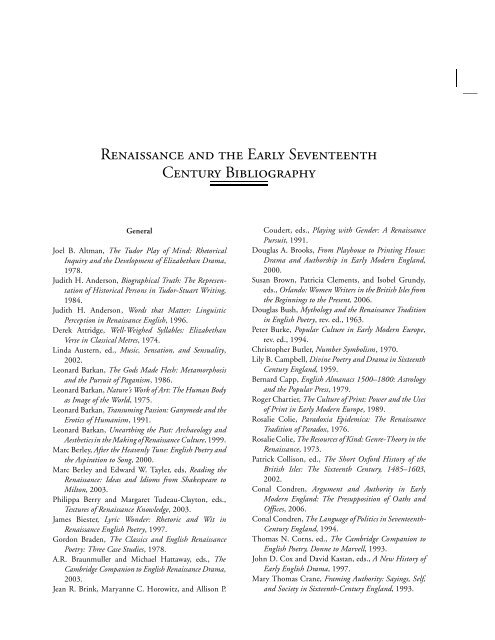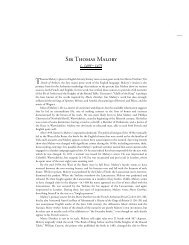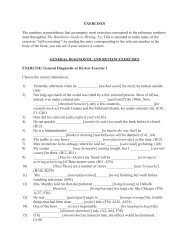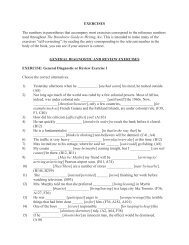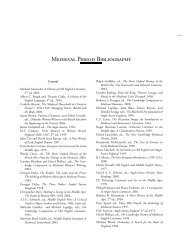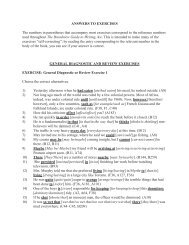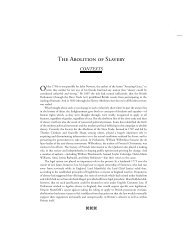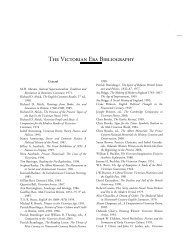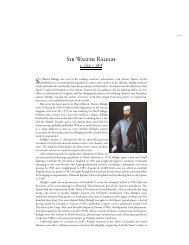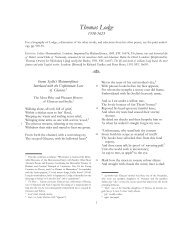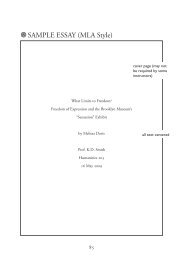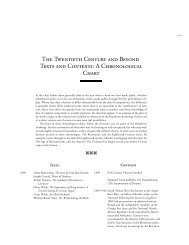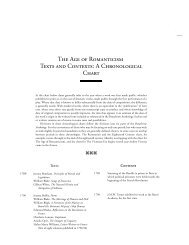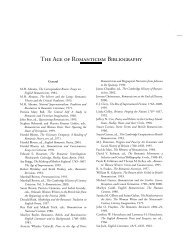Concise Edition Bibliography - Broadview Press Publisher's Blog
Concise Edition Bibliography - Broadview Press Publisher's Blog
Concise Edition Bibliography - Broadview Press Publisher's Blog
You also want an ePaper? Increase the reach of your titles
YUMPU automatically turns print PDFs into web optimized ePapers that Google loves.
Renaissance and the Early Seventeenth<br />
Century <strong>Bibliography</strong><br />
General<br />
Joel B. Altman, The Tudor Play of Mind: Rhetorical<br />
Inquiry and the Development of Elizabethan Drama,<br />
1978.<br />
Judith H. Anderson, Biographical Truth: The Representation<br />
of Historical Persons in Tudor-Stuart Writing,<br />
1984.<br />
Judith H. Anderson, Words that Matter: Linguistic<br />
Perception in Renaissance English, 1996.<br />
Derek Attridge, Well-Weighed Syllables: Elizabethan<br />
Verse in Classical Metres, 1974.<br />
Linda Austern, ed., Music, Sensation, and Sensuality,<br />
2002.<br />
Leonard Barkan, The Gods Made Flesh: Metamorphosis<br />
and the Pursuit of Paganism, 1986.<br />
Leonard Barkan, Nature’s Work of Art: The Human Body<br />
as Image of the World, 1975.<br />
Leonard Barkan, Transuming Passion: Ganymede and the<br />
Erotics of Humanism, 1991.<br />
Leonard Barkan, Unearthing the Past: Archaeology and<br />
Aesthetics in the Making of Renaissance Culture, 1999.<br />
Marc Berley, After the Heavenly Tune: English Poetry and<br />
the Aspiration to Song, 2000.<br />
Marc Berley and Edward W. Tayler, eds, Reading the<br />
Renaissance: Ideas and Idioms from Shakespeare to<br />
Milton, 2003.<br />
Philippa Berry and Margaret Tudeau-Clayton, eds.,<br />
Textures of Renaissance Knowledge, 2003.<br />
James Biester, Lyric Wonder: Rhetoric and Wit in<br />
Renaissance English Poetry, 1997.<br />
Gordon Braden, The Classics and English Renaissance<br />
Poetry: Three Case Studies, 1978.<br />
A.R. Braunmuller and Michael Hattaway, eds., The<br />
Cambridge Companion to English Renaissance Drama,<br />
2003.<br />
Jean R. Brink, Maryanne C. Horowitz, and Allison P.<br />
Coudert, eds., Playing with Gender: A Renaissance<br />
Pursuit, 1991.<br />
Douglas A. Brooks, From Playhouse to Printing House:<br />
Drama and Authorship in Early Modern England,<br />
2000.<br />
Susan Brown, Patricia Clements, and Isobel Grundy,<br />
eds., Orlando: Women Writers in the British Isles from<br />
the Beginnings to the Present, 2006.<br />
Douglas Bush, Mythology and the Renaissance Tradition<br />
in English Poetry, rev. ed., 1963.<br />
Peter Burke, Popular Culture in Early Modern Europe,<br />
rev. ed., 1994.<br />
Christopher Butler, Number Symbolism, 1970.<br />
Lily B. Campbell, Divine Poetry and Drama in Sixteenth<br />
Century England, 1959.<br />
Bernard Capp, English Almanacs 1500–1800: Astrology<br />
and the Popular <strong>Press</strong>, 1979.<br />
Roger Chartier, The Culture of Print: Power and the Uses<br />
of Print in Early Modern Europe, 1989.<br />
Rosalie Colie, Paradoxia Epidemica: The Renaissance<br />
Tradition of Paradox, 1976.<br />
Rosalie Colie, The Resources of Kind: Genre-Theory in the<br />
Renaissance, 1973.<br />
Patrick Collison, ed., The Short Oxford History of the<br />
British Isles: The Sixteenth Century, 1485–1603,<br />
2002.<br />
Conal Condren, Argument and Authority in Early<br />
Modern England: The Presupposition of Oaths and<br />
Offices, 2006.<br />
Conal Condren, The Language of Politics in Seventeenth-<br />
Century England, 1994.<br />
Thomas N. Corns, ed., The Cambridge Companion to<br />
English Poetry, Donne to Marvell, 1993.<br />
John D. Cox and David Kastan, eds., A New History of<br />
Early English Drama, 1997.<br />
Mary Thomas Crane, Framing Authority: Sayings, Self,<br />
and Society in Sixteenth-Century England, 1993.
2 <strong>Broadview</strong> Anthology of British Literature<br />
David Cressy, Birth, Marriage, and Death: Ritual,<br />
Religion, and the Life-Cycle in Tudor and Stuart<br />
England, 1997.<br />
David Cressy, Education in Tudor and Stuart England,<br />
1975.<br />
David Cressy, Literacy and the Social Order: Reading and<br />
Writing in Tudor and Stuart England, 1980.<br />
David Cressy, Travesties and Transgressions in Tudor and<br />
Stuart England: Tales of Discord and Dissension,<br />
2000.<br />
Jonathan V. Crewe, Trials of Authorship: Anterior Forms<br />
and Poetic Reconstruction from Wyatt to Shakespeare,<br />
1990.<br />
Lorraine Daston and Katharine Park, Wonders and the<br />
Order of Nature, 1150–1750, 1998.<br />
Lloyd Davis, ed., Sexuality and Gender in the English<br />
Renaissance: An Annotated <strong>Edition</strong> of Contemporary<br />
Documents, 1998.<br />
Walter Davis, Idea and Act in Elizabethan Fiction, 1969.<br />
Allan G. Debus and Michael T. Walton, eds., Reading<br />
the Book of Nature: The Other Side of the Scientific<br />
Revolution, 1998.<br />
Huston Diehl, Staging Reform, Reforming the Stage:<br />
Protestantism and Popular Theater in Early Modern<br />
England, 1997.<br />
Mario DiGangi, The Homoerotics of Early Modern<br />
Drama, 1997.<br />
Stephen B. Dobranski, Readers and Authorship in Early<br />
Modern England, 2005.<br />
Madeleine Doran, Endeavors of Art: A Study of Form in<br />
Elizabethan Drama, 1964.<br />
Elizabeth L. Eisenstein, The Printing <strong>Press</strong> as Agent of<br />
Change: Communications and Cultural Transformations<br />
in Early Modern Europe, 1979.<br />
Elizabeth L. Eisenstein, The Printing Revolution in Early<br />
Modern Europe, 2005.<br />
Norbert Elias, The Civilizing Process: The History of<br />
Manners, 1982.<br />
Peter Erickson and Clark Hulse, eds., Early Modern<br />
Visual Culture: Representation, Race, and Empire in<br />
Renaissance England, 2000.<br />
Andrew Escobedo, Nationalism and Historical Loss in<br />
Renaissance England: Foxe, Dee, Spenser, Milton,<br />
2004.<br />
David Evett, Literature and the Visual Arts in Tudor<br />
England, 1990.<br />
Margaret W. Ferguson, Maureen Quilligan, and Nancy<br />
Vickers, eds., Rewriting the Renaissance: The<br />
Discources of Sexual Difference in Early Modern<br />
Europe, 1986.<br />
Daniel Fischlin, In Small Proportions: A Poetics of the<br />
English Ayre 1596–1622, 1998.<br />
Stanley Fish, Self-Consuming Artifacts: The Experience of<br />
Seventeenth-Century Literature, 1972.<br />
Stanley Fish, ed., Seventeenth-Century Prose: Modern<br />
Essays in Criticism, 1971.<br />
Rosemary Freeman, English Emblem Books, 1948.<br />
Patricia Fumerton, Cultural Aesthetics: Renaissance<br />
Literature and the Practice of Social Ornament, 1991.<br />
Jonathan Goldberg, Queering the Renaissance, 1994.<br />
Jonathan Goldberg, Sodometries: Renaissance Texts,<br />
Modern Sexualities, 1992.<br />
Stephen Greenblatt, Renaissance Self-Fashioning: From<br />
More to Shakespeare, 2005.<br />
Stephen Greenblatt, Shakespearean Negotiations: The<br />
Circulation of Social Energy in Renaissance England,<br />
1988.<br />
Stephen Greenblatt, ed., Representing the English Renaissance,<br />
1988.<br />
Thomas M. Greene, The Light in Troy: Imitation and<br />
Discovery in Renaissance Poetry, 1982.<br />
Achsah Guibbory, The Map of Time: Seventeenth-<br />
Century English Literature and Ideas of Pattern in<br />
History, 1986.<br />
John Guy, Tudor England, 1988.<br />
Stephen Guy-Bray, Homoerotic Space: The Poetics of Loss<br />
in Renaissance Literature, 2002.<br />
Heidi Brayman Hackel, Reading Material in Early<br />
Modern England: Print, Gender, and Literacy, 2005.<br />
Andrew Hadfield, The English Renaissance, 1500–1620,<br />
2000.<br />
Richard Halpern, Poetics of Primitive Accumulation:<br />
English Renaissance Culture and the Genealogy of<br />
Capital, 1991.<br />
O.B. Hardison, Prosody and Purpose in the English<br />
Renaissance, 1989.<br />
Richard Helgerson, The Elizabethan Prodigals, 1976.<br />
Richard Helgerson, Forms of Nationhood: The Elizabethan<br />
Writing of England, 1992.<br />
Richard Helgerson, Self-Crowned Laureates: Spenser,
Jonson, Milton, and the Literary System, 1983.<br />
Margo Hendricks and Patricia Parker, eds., Women,<br />
“Race,” and Writing in the Early Modern Period, 1994.<br />
S.K. Heninger, The Cosmological Glass: Renaissance<br />
Diagrams of the Universe, 1977.<br />
S.K. Heninger, Touches of Sweet Harmony: Pythagorean<br />
Cosmology and Renaissance Poetics, 1974.<br />
Sandra Hindman, Printing the Written Word: The Social<br />
History of Books, circa 1450–1520, 1991.<br />
Jean Howard, The Stage and Social Struggle in Early<br />
Modern England, 1994.<br />
Clark Hulse, Metaphoric Verse: The Elizabethan Minor<br />
Epic, 1981.<br />
Clark Hulse, The Rule of Art: Literature and Painting in<br />
the Renaissance, 1990.<br />
John Huntington, Ambition, Rank, and Poetry in 1590s<br />
England, 2001.<br />
David Kastan, ed., Oxford Encyclopedia of British<br />
Literature, 2006.<br />
David Kastan and Peter Stallybrass, eds., Staging the<br />
Renaissance: Essays on Elizabethan and Jacobean<br />
Drama, 1991.<br />
Donald R. Kelley and David H. Sacks, eds., The<br />
Historical Imagination in Early Modern Britain:<br />
History, Rhetoric, and Fiction, 1500–1800, 1997.<br />
John N. King, English Reformation Literature: The<br />
Tudor Origins of the Protestant Tradition, 1982.<br />
John N. King, ed., Voices of the English Reformation: A<br />
Sourcebook, 2004.<br />
Arthur F. Kinney, ed., The Cambridge Companion to<br />
English Literature 1500–1600, 2000.<br />
Arthur F. Kinney, ed., A Companion to Renaissance<br />
Drama, 2002.<br />
Arthur F. Kinney and David W. Swain, eds., Tudor<br />
England: An Encyclopedia, 2001.<br />
Jill Kraye, ed., The Cambridge Companion to Renaissance<br />
Humanism, 1996.<br />
Thomas Laqueur, Making Sex: Body and Gender from<br />
the Greeks to Freud, 1990.<br />
Zachary Lesser, The Politics of Publication: The Never-<br />
Writers and Ever-Readers of Early Stuart Drama,<br />
2001.<br />
Joseph Levine, Humanism and History: Origins of<br />
Modern English Historiography, 1987.<br />
Barbara Lewalski, Protestant Poetics and the Seventeenth<br />
Renaissance and the Early Seventeenth Century <strong>Bibliography</strong> 3<br />
Century, 1979.<br />
Fritz Levy, Tudor Historical Thought, 1967.<br />
Joseph Loewenstein, The Author’s Due: Printing and the<br />
Prehistory of Copyright, 2002.<br />
George M. Logan and Gordon Teskey, eds., Unfolded<br />
Tales: Essays on Renaissance Romance, 1989.<br />
Lawrence Manley, Convention: 1500–1750, 1980.<br />
Lawrence Manley, Literature and Culture in Early<br />
Modern London, 2005.<br />
Katharine Maus, Inwardness and Theater in the English<br />
Renaissance, 1995.<br />
Carla Mazzio, ed., The Body in Parts: Fantasies of<br />
Corporeality in Early Modern Europe, 1997.<br />
Diane Kelsey McColley, Poetry and Music in<br />
Seventeenth-Century England, 1997.<br />
Naomi J. Miller and Naomi Yavneh, eds., Maternal<br />
Measures: Figuring Caregiving in the Early Modern<br />
Period, 2000.<br />
Louis Montrose, The Purpose of Playing: Shakespeare and<br />
the Cultural Politics of the Elizabethan Theatre, 1996.<br />
John Morrill, ed., The Oxford Illustrated History of<br />
Tudor and Stuart Britain, 1996.<br />
John Morrill, ed., Reactions to the English Civil War,<br />
1642–1649, 1984.<br />
Ian F. Moulton, Before Pornography: Explicitly Erotic<br />
Writing in Early Modern England, 1995.<br />
Marjorie Hope Nicolson, The Breaking of the Circle:<br />
Studies in the Effect of the “New Science” Upon<br />
Seventeenth-Century Poetry, rev. ed., 1962.<br />
Marcy L. North, The Anonymous Renaissance: Cultures<br />
of Discretion in Tudor-Stuart England, 2003.<br />
Glyn P. Norton, ed., The Cambridge History of Literary<br />
Criticism: The Renaissance, 1999.<br />
Stephen Orgel, Impersonations: The Performance of<br />
Gender in Shakespeare’s England, 1996.<br />
Stephen Orgel, The Illusion of Power: Political Theater in<br />
the English Renaissance, 1975.<br />
Patricia A. Parker, Inescapable Romance: Studies in the<br />
Poetics of a Mode, 1979.<br />
Gail Kern Paster, The Body Embarrassed: Drama and the<br />
Discipline of Shame in Early Modern England, 1993.<br />
Gail Kern Paster, Katherine Rowe, and Mary Floyd-<br />
Wilson, eds., Reading the Early Modern Passions:<br />
Essays in the Cultural History of Emotion, 2004.<br />
C.A. Patrides and Raymond B. Waddington, eds., The
4 <strong>Broadview</strong> Anthology of British Literature<br />
Age of Milton: Backgrounds to Seventeenth-Century<br />
Literature, 1980.<br />
Annabel Patterson, Censorship and Interpretation: The<br />
Conditions of Writing and Reading in Early Modern<br />
England, 1984.<br />
Annabel Patterson, ed., Early Modern Liberalism, 2006.<br />
Annabel Patterson, ed., Early Modern Reader: Literature<br />
and Religion—1530–1681, vol. 1, 2007.<br />
Peter G. Platt, ed., Wonders, Marvels, and Monsters in<br />
Early Modern Culture, 1999.<br />
Heinrich F. Plett, Rhetoric and Renaissance Culture,<br />
2004.<br />
Robert Poole, Time’s Alteration: Calendar Reform in<br />
Early Modern England, 1998.<br />
David Quint, Epic and Empire: Politics and Generic<br />
Form from Virgil to Milton, 1993.<br />
David Quint, Origin and Originality in Renaissance<br />
Literature: Versions of the Source, 1983.<br />
Anne Lake Prescott, French Poets and the English<br />
Renaissance: Studies in Fame and Transformation,<br />
1978.<br />
Maureen Quilligan, Incest and Agency in Elizabeth’s<br />
England, 2005.<br />
Neil Rhodes and Jonathan Sawday, eds., The<br />
Renaissance Computer: Knowledge Technology in the<br />
First Age of Print, 2000.<br />
Jasper Ridley, The Tudor Age, 1988.<br />
Jonathan Sawday, The Body Emblazoned: Dissection and<br />
the Human Body in Renaissance Culture, 1996<br />
Winfried Schleiner, Medical Ethics in the Renaissance,<br />
1995.<br />
Michael C. Schoenfeldt, Bodies and Selves in Early<br />
Modern England: Physiology and Inwardness in Early<br />
Modern England, 1999.<br />
Jean Seznec, The Survival of the Pagan Gods: The<br />
Mythological Tradition and its Place in Renaissance<br />
Humanism and Art, trans. Barbara F. Sessions, 1953.<br />
Kevin Sharpe and Steven N. Zwicker, eds., Politics of<br />
Discourse: The Literature and History of Seventeenth-<br />
Century England, 1987.<br />
Debora K. Shuger, Censorship and Cultural Sensibility:<br />
The Regulation of Language in Tudor-Stuart England,<br />
2005.<br />
Debora K. Shuger, The Renaissance Bible: Scholarship,<br />
Sacrifice, and Subjectivity, 1994.<br />
Wayne Shumaker, The Occult Sciences in the Renaissance:<br />
A Study in Intellectual Patterns, 1972.<br />
Peter Stallybrass and Allon White, The Politics and<br />
Poetics of Transgression, 1986.<br />
Alan Stewart and Heather Wolfe, Letterwriting in<br />
Renaissance England, 2004.<br />
Lawrence Stone, The Causes of the English Revolution,<br />
1529–1642, 1972.<br />
Lawrence Stone, The Family, Sex and Marriage in<br />
England, 1500–1800, 1979.<br />
Lawrence Stone, Social Change and Revolution in<br />
England, 1540–1640, 1970.<br />
Roy C. Strong, The Cult of Elizabeth: Elizabethan<br />
Portraiture and Pageantry, 1977.<br />
Roy C. Strong, Splendor at Court: Renaissance Spectacle<br />
and the Theater of Power, 1973.<br />
Margorie Swan, Curiosities and Texts: The Culture of<br />
Collecting in Early Modern England, 2001.<br />
Gordon Teskey, Allegory and Violence, 1996.<br />
Keith Thomas, Man and the Natural World: Changing<br />
Attitudes in England 1500–1800, 1996.<br />
Keith Thomas, Religion and the Decline of Magic, 1971.<br />
Wendy Wall, The Imprint of Gender: Authorship and<br />
Publication in the English Renaissance, 1993.<br />
Wendy Wall, Staging Domesticity: Household Work and<br />
English Identity in Early Modern Drama, 2002.<br />
Robin Headlam Wells, Elizabethan Mythologies: Studies<br />
in Poetry, Drama, and Music, 1994.<br />
Helen Wilcox, ed., Women and Literature in Britain,<br />
1500–1700, 1996.<br />
Deanne Williams, The French Fetish from Chaucer to<br />
Shakespeare, 2004.<br />
Edgar Wind, Pagan Mysteries in the Renaissance, rev. ed.,<br />
1980.<br />
Jessica Wolfe, Humanism, Machinery and Renaissance<br />
Literature, 2004.<br />
D.R. Woolf, The Idea of History in Early Stuart England,<br />
1990.<br />
Frances A. Yates, Astraea: The Imperial Theme in the<br />
Sixteenth Century, 1975.<br />
Frances A. Yates, The Art of Memory, new ed., 1992.<br />
Frances A. Yates, The Occult Philosophy in the Elizabethan<br />
Age, 1979.
Francis Bacon<br />
Texts: A variety of editions have been consulted.<br />
Spelling and punctuation have been modernized in<br />
accordance with the practice of the anthology.<br />
<strong>Edition</strong>s:<br />
Susan Bruce, ed., Three Early Modern Utopias: Thomas<br />
More, Utopia, Francis Bacon, New Atlantis, and<br />
Henry Neville, Isle of Pines, 2000.<br />
Robert Leslie Ellis, James Spedding, and Douglas Denon<br />
Heath, eds., The Works of Francis Bacon, 14 vols.,<br />
1858–1874.<br />
Arthur J. Johnston, ed., The Advancement of Learning<br />
and New Atlantis, 1974.<br />
Richard Foster Jones, ed., Francis Bacon: Essays,<br />
Advancement of Learning, New Atlantis, and Other<br />
Pieces, 1937.<br />
Michael Kiernan, ed. The Advancement of Learning,<br />
2000.<br />
Michael Kiernan, ed., The Essayes or Counsels, 1985.<br />
John Pitcher, ed., The Essays, 1985.<br />
Brian Vickers, ed., The Major Works: Francis Bacon,<br />
2002.<br />
Sidney Warhaft, ed., Francis Bacon: A Selection of his<br />
Works, 1965.<br />
Biographies:<br />
Catherine Drinker Bowen, Francis Bacon: The Temper<br />
of a Man, 2 nd ed,. 1993.<br />
Daphne Du Maurier, Winding Stair: Francis Bacon, his<br />
Rise and Fall, 1976.<br />
Lisa Jardine and Alan Stewart, Hostage to Fortune: The<br />
Troubled Life of Francis Bacon, 1998.<br />
Criticism:<br />
John C. Briggs, Francis Bacon and the Rhetoric of<br />
Nature, 1989.<br />
Stephen Gaukroger, Francis Bacon and the Transformation<br />
of Early-Modern Philosophy, 2001.<br />
Lisa Jardine, Francis Bacon: Discovery and the Art of<br />
Discourse, 1974.<br />
Stephen A. McKnight, The Religious Foundations of<br />
Francis Bacon’s Thought, 2006.<br />
Renaissance and the Early Seventeenth Century <strong>Bibliography</strong> 5<br />
Markku Peltonen, ed., The Cambridge Companion to<br />
Bacon, 1996.<br />
Bronwen Price, ed., Francis Bacon’s New Atlantis: New<br />
Interdisciplinary Essays, 2002<br />
William A. Sessions, ed., Francis Bacon's Legacy of Texts,<br />
1990.<br />
Julie Robin Solomon and Catherine Gimelli Martin,<br />
eds., Francis Bacon and the Refiguring of Early<br />
Modern Thought: Essays to Commemorate the<br />
Advancement of Learning (1605–2005), 2005.<br />
Brian Vickers, Francis Bacon and Renaissance Prose, 1968.<br />
Peter Zagorin, Francis Bacon, 1998.<br />
Contexts: Culture: A Portfolio<br />
Heidi Hackel Brayman, Reading Material in Early<br />
Modern England: Print, Gender, and Literacy, 2005.<br />
Gillian E. Brennan, Patriotism, Power, and Print:<br />
National Consciousness in Tudor England, 2003.<br />
Katharine M. Briggs, The Anatomy of Puck: An Examination<br />
of Fairy Beliefs Among Shakespeare’s Contemporaries<br />
and Successors, 1959.<br />
Katharine M. Briggs, Pale Hecate’s Team: An<br />
Examination of the Beliefs on Witchcraft and Magic<br />
Among Shakespeare’s Contemporaries and his Immediate<br />
Successors, 1962.<br />
Michael Bristol, Carnival and Theater: Plebeian Culture<br />
and the Structure of Authority in Renaissance England,<br />
1989.<br />
Douglas A. Brooks, ed., Printing and Parenting in Early<br />
Modern England, 2005.<br />
Sandra Clark, Women and Crime in the Street Literature<br />
of Early Modern England, 2003.<br />
Cynthia Clegg, <strong>Press</strong> Censorship in Elizabethan England,<br />
1997.<br />
David Cressy, Birth, Marriage, and Death: Ritual,<br />
Religion, and the Life-Cycle in Tudor and Stuart<br />
England, 1997.<br />
David Cressy, Bonfires and Bells: National Memory and<br />
the Protestant Calendar in Elizabethan and Stuart<br />
England, 1989.<br />
Owen Davies, Cunning Folk: Popular Magic in English<br />
History, 2003.
6 <strong>Broadview</strong> Anthology of British Literature<br />
Frances Dolan, Dangerous Familiars: Representations of<br />
Domestic Crime in England 1550–1700, 1994.<br />
Martin Elsky, Authorizing Words: Speech, Writing, and<br />
Print in the English Renaissance, 1989.<br />
Peter Erickson and Clark Hulse, eds., Early Modern<br />
Visual Culture: Representation, Race, and Empire in<br />
Renaissance England, 2000.<br />
Margaret Ezell, Social Authorship and the Advent of<br />
Print, 1999.<br />
Boris Ford, ed., The Cambridge Cultural History of<br />
Britain: Seventeenth-Century Britain, 1992.<br />
Boris Ford, ed., The Cambridge Cultural History of<br />
Britain: Sixteenth-Century Britain, 1992.<br />
S.L. Greenslade, ed., The Cambridge History of the Bible,<br />
1963.<br />
Alexandra Halasz, The Marketplace of Print: Pamphlets<br />
and the Public Sphere in Early Modern England,<br />
1997.<br />
Kim Hall, Things of Darkness: Economies of Race and<br />
Gender in Early Modern England, 1995.<br />
John Hollander, The Untuning of the Sky: Ideas of Music<br />
in English Poetry, 1500–1700, 1961.<br />
Skiles Howard, The Politics of Courtly Dancing in Early<br />
Modern England, 1998.<br />
Linda Hults, The Witch as Muse: Art, Gender, and Power<br />
in Early Modern Europe, 2005.<br />
Ronald Hutton, The Rise and Fall of Merry England: The<br />
Ritual Year 1400–1700, 1994.<br />
Nathan Johnstone, The Devil and Demonism in Early<br />
Modern England, 2006.<br />
Ann Rosalind Jones and Peter Stallybrass, Renaissance<br />
Clothing and the Materials of Memory, 2000.<br />
Jenny Kermode and Garthine Walker, eds., Women,<br />
Crime and the Courts in Early Modern England,<br />
1994.<br />
Arthur F. Kinney, ed., Rogues, Vagabonds, and Sturdy<br />
Beggars: A New Gallery of Tudor and Early Stuart<br />
Rogue Literature Exposing the Lives, Times, and<br />
Cozening Tricks of the Elizabethan Underworld,<br />
1990.<br />
Suzanne Lord, Music from the Age of Shakespeare: A<br />
Cultural History, 2003.<br />
Leah S. Marcus, The Politics of Mirth: Jonson, Herrick,<br />
Milton, Marvell, and the Defense of Old Holiday<br />
Pastimes, 1986.<br />
Arthur F. Marotti and Michael D. Bristol, eds., Print,<br />
Manuscript, and Performance: The Changing Relations<br />
of the Media in Early Modern England, 2000.<br />
Claire McEachern and Debora Shuger, eds., Religion<br />
and Culture in Renaissance England, 1997.<br />
John S. Mebane, Renaissance Magic and the Return of the<br />
Golden Age: The Occult Tradition and Marlowe,<br />
Jonson, and Shakespeare, 1989.<br />
David Norton, A History of the Bible as Literature, 1993.<br />
Stephen Orgel and Roy Strong, eds., The Theatre of the<br />
Stuart Court; Including the Complete Designs for<br />
Productions at Court, for the Most Part in the<br />
Collection of the Duke of Devonshire, Together with<br />
their Texts and Historical Documentation, 1973.<br />
Robert Poole, The Lancashire Witches: Histories and<br />
Stories, 2002.<br />
Anne Lake Prescott, “Refusing Translation: The<br />
Gregorian Calendar and Early Modern English<br />
Writers,” The Yearbook of English Studies 36, 2006:<br />
1–11.<br />
Barbara Rosen, ed., Witchcraft in England, 1558–1618,<br />
1969.<br />
Gregory M. Colón Semenza, Sport, Politics, and<br />
Literature in the English Renaissance, 2003.<br />
James Sharpe, Crime in Early Modern England, 1550–<br />
1750, 2 nd ed., 1999.<br />
James Sharpe and Richard Golden, eds., English<br />
Witchcraft, 1560–1736, 2003.<br />
Adam Smyth, ed., A Pleasing Sinne: Drink and<br />
Conviviality in Seventeenth-Century England, 2004.<br />
Richard W. Unger, Beer in the Middle Ages and the<br />
Renaissance, 2004.<br />
Brian Vickers, ed., Francis Bacon: The Major Works,<br />
1996.<br />
Gary K. Waite, Heresy, Magic, and Witchcraft in Early<br />
Modern Europe, 2003.<br />
Wendy Wall, The Imprint of Gender: Authorship and<br />
Publication in the English Renaissance, 1993.<br />
Izaak Walton, The Compleat Angler, 1653–1976, ed.<br />
Jonquin Bevan, 1983.<br />
Tessa Watt, Cheap Print and Popular Piety, 1550–1640,<br />
1991.<br />
Robert Hunter West, The Invisible World: A Study of<br />
Pneumatology in Elizabethan Drama, 1939.<br />
Paul M. Zall, ed., A Hundred Merry Tales, and Other
English Jestbooks of the Fifteenth and Sixteenth<br />
Centuries, 1963.<br />
Paul M. Zall, ed., A Nest of Ninnies, and Other English<br />
Jestbooks of the Seventeenth Century, 1970.<br />
John Donne<br />
Texts: A variety of editions have been consulted.<br />
Spelling and punctuation have been modernized in<br />
accordance with the practice of the anthology.<br />
<strong>Edition</strong>s:<br />
John Carey, ed., John Donne: The Major Works, 2000.<br />
Arthur L. Clemens, ed., John Donne’s Poetry: Authoritative<br />
Texts, Criticism, 1991.<br />
Charles M. Coffin, ed., The Complete Poetry and Selected<br />
Prose of John Donne, 2001.<br />
Helen Gardner, ed., The Divine Poems: John Donne, 2 nd<br />
ed., 1978.<br />
Helen Gardner, ed., John Donne: The Elegies and the<br />
Songs and Sonnets, 1965.<br />
Theodore Gill, ed., The Sermons of John Donne, 1958.<br />
H.J.C. Grierson, ed., The Poems of John Donne, 1912.<br />
C.A. Patrides, ed., The Complete English Poems, 1991.<br />
George R. Potter and Evelyn Simpson, eds., The<br />
Sermons of John Donne, 10 vols., 1953–1962.<br />
Neil Rhodes, ed., Selected Prose: John Donne, 1987.<br />
A.J. Smith, ed., John Donne: The Complete English<br />
Poems, 1971.<br />
Gary A. Stringer and Paul A. Parrish, eds., The<br />
Variorum <strong>Edition</strong> of the Poetry of John Donne, 1995–.<br />
Biographies:<br />
Robert Cecil Bald, John Donne: A Life, 1985.<br />
John Carey, John Donne: Life, Mind and Art, 1981.<br />
David Colclough, ed., John Donne’s Professional Lives,<br />
2003.<br />
David Edwards, John Donne: Man of Flesh and Spirit,<br />
2001.<br />
George Saintsbury, ed., Izaac Walton’s Life of Dr. John<br />
Donne, 1927.<br />
Criticism:<br />
James S. Baumlin, John Donne and the Rhetorics of<br />
Renaissance and the Early Seventeenth Century <strong>Bibliography</strong> 7<br />
Renaissance Discourse, 1991.<br />
Harold Bloom, ed., John Donne and the Seventeenth-<br />
Century Metaphysical Poets, 1986.<br />
Cleanth Brooks, The Well Wrought Urn: Studies in the<br />
Structure of Poetry, 1949.<br />
Naresh Chandra, John Donne and Metaphysical Poetry,<br />
1990.<br />
Rosalie Colie, Paradoxia Epidemica: The Renaissance<br />
Tradition of Paradox, 1966.<br />
Ronald Corthell, Ideology and Desire in Renaissance<br />
Poetry: The Subject of Donne, 1997.<br />
A.D. Cousins and Damian Grace, Donne and the<br />
Resources of Kind, 2002.<br />
Theresa M. DiPasquale, Literature and Sacrament: The<br />
Sacred and the Secular in John Donne, 1999.<br />
Achsah Guibbory, ed., The Cambridge Companion to<br />
John Donne, 2006.<br />
T.S. Eliot, The Varieties of Metaphysical Poetry, ed.<br />
Ronald Schuchard, 1993.<br />
William Empson, Essays on Renaissance Literature:<br />
Volume 1: Donne and the New Philosophy, ed. John<br />
Haffenden, 2002.<br />
Barbara L. Estrin, Laura: Uncovering Gender and Genre<br />
in Wyatt, Donne, and Marvell, 1994.<br />
Raymond-Jean Frontain and Frances M. Malpezzi, eds.,<br />
John Donne’s Religious Imagination: Essays in Honor<br />
of John T. Shawcross, 1995.<br />
Thomas Hester, Kinde Pitty and Brave Scorn: John<br />
Donne’s Satyrs, 1982.<br />
Jeffrey Johnson, The Theology of John Donne, 2001.<br />
Elizabeth M.A. Hodgson, Gender and the Sacred Self in<br />
John Donne, 1999.<br />
Arthur Marotti, John Donne: Coterie Poet, 1986.<br />
Arthur Marotti, ed., Critical Essays on John Donne,<br />
1994.<br />
Brent Nelson, Holy Ambition: Rhetoric, Courtship, and<br />
Devotion in the Sermons of John Donne, 2005.<br />
Mary Arshagouni Papazian and Ronald Corthell, eds.,<br />
John Donne and the Protestant Reformation: New<br />
Perspectives, 2003.<br />
Robert H. Ray, A John Donne Companion, 1990.<br />
Murray Roston, The Soul of Wit: A Study of John Donne,<br />
1974.<br />
A.J. Smith, ed., John Donne: The Critical Heritage,<br />
1975.
8 <strong>Broadview</strong> Anthology of British Literature<br />
Claude J. Summers and Ted-Larry Pebworth, eds., The<br />
Eagle and the Dove: Reassessing John Donne, 1986.<br />
Edward W. Tayler, Donne’s Idea of a Woman, 1991.<br />
Helen Wilcox, Richard Todd, and Alasdair MacDonald,<br />
eds., Sacred and Profane: Secular and Devotional<br />
Interplay in Early Modern British Literature, 1996.<br />
Elizabeth I<br />
Texts: The texts of the two letters to Catherine de<br />
Burbon have been newly translated from the French<br />
for this anthology by Anne Lake Prescott. Other<br />
texts have been prepared by Marie H. Loughlin,<br />
Sandra J. Bell, and Patricia Brace for the forthcoming<br />
<strong>Broadview</strong> Anthology of Sixteenth-Century<br />
Poetry and Prose.<br />
<strong>Edition</strong>s:<br />
Leicester Bradner, ed., The Poems of Elizabeth I, 1964.<br />
Leah S. Marcus, Janel Mueller, and Mary Beth Rose,<br />
eds., Elizabeth I: Collected Works, 2000.<br />
Steven May, Queen Elizabeth I: Selected Works, 2004.<br />
Caroline Pemberton, ed., Queen Elizabeth’s Englishings<br />
of Boethius, Plutarch and Horace, 1975.<br />
Biographies:<br />
Christopher Haigh, Elizabeth I, 1988.<br />
D.M. Loades, Elizabeth I: Ruler and Legend, 2003.<br />
Wallace MacCaffrey, Elizabeth I, 1993.<br />
Maria Perry, The Word of a Prince: The Life of Elizabeth<br />
from Contemporary Documents, 1990.<br />
David Starkey, Elizabeth: The Struggle for the Throne,<br />
2000.<br />
Roy Strong, Portraits of Queen Elizabeth I, 1963.<br />
Frances A. Yates, Astraea: The Imperial Theme in the<br />
Sixteenth Century, 1975.<br />
Criticism:<br />
Marie Axton, The Queen’s Two Bodies: Drama and<br />
Elizabethan Succession, 1977.<br />
Philippa Berry, Of Chastity and Power: Elizabethan<br />
Literature and the Unmarried Queen, 1989.<br />
Mary Hill Cole, The Portable Queen, 2000.<br />
Susan Frye, Elizabeth I: The Competition for Representa-<br />
tion, 1993.<br />
Peter C. Herman, ed., Reading Monarch’s Writing: The<br />
Poetry of Henry VIII, Mary Stuart, Elizabeth I, and<br />
James VI/I, 2002.<br />
Carole Levin, The Heart and Stomach of a King:<br />
Elizabeth I and the Politics of Sex and Power, 1994.<br />
Elizabeth I In Context:<br />
The Defeat of the Spanish Armada<br />
Martin Colin and Geoffrey Parker, The Spanish<br />
Armada, rev. ed., 1991.<br />
Garrett Mattingly, The Armada, 1959.<br />
James McDermott, England and the Spanish Armada:<br />
The Necessary Quarrel, 2005.<br />
The Elizabethan Sonnet and Lyric<br />
Texts: The translations from the French “If This, Our<br />
Life, Be Less than but a Day” and of “When you are<br />
very old, by candle’s flame’’ are by Worman R.<br />
Shapiro, copyright Yale University <strong>Press</strong>, 2002.<br />
Translation from the Italian of “When in my<br />
weeping I inquire of love” is by Laura Anna Stortoni<br />
and Mary Prentice Lillie, copyright Italica <strong>Press</strong>,<br />
1997. For texts in English, a variety of editions have<br />
been consulted. Except where otherwise indicated,<br />
spelling and punctuation have been modernized in<br />
accordance with the practice of the anthology.<br />
<strong>Edition</strong>s:<br />
John Buxton, ed., Poems of Michael Drayton, 2 vols.,<br />
1953.<br />
Maurice Evans, ed., Elizabethan Sonnets, 1977.<br />
George Gascoigne, A Hundreth Sudrie Flowres, ed. G.<br />
W. Pigman III, 2000.<br />
Alexander B. Grosart, ed., The Complete Works os Sir<br />
John Davies of Hereford (15??–1618), 1878.<br />
Geoffrey Hiller and Peter Groves, eds., Samuel Daniel:<br />
Selected Poetry and A Defense of Rhyme, 1998.<br />
John Hollander, ed., The Elizabethan Sonnet Sequence,<br />
2001.<br />
Nichlas Kilmer, Poems of Pierre de Ronsard, 1979.<br />
George Klawitter, ed. Richard Barnfield: The Complete<br />
Poems, 1990.
Phillis Levin, ed., The Penguin Book of the Sonnet, 2001.<br />
Norman Shapiro, ed. and trans., Lyrics of the French<br />
Renaissance: Marot, Du Bellay, Ronsard, 2002.<br />
Arthur C. Sprague, Samuel Daniel: Poems and a Defence<br />
of Rhyme, 1930.<br />
Laura Anna Stortori and Mary Prentice Lillie, eds. and<br />
trans., Gaspara Stampa: Selected Poems, 1994.<br />
Laura Anna Stortoni and Mary Prentice Lillie, eds. and<br />
trans., Women Poets of the Italian Renaissance:<br />
Courtly Ladies and Courtesans, 1997.<br />
Criticism:<br />
Raymond Anselment, “Betwixt Jest and Earnest”:<br />
Marprelate, Milton, Marvell, Swift and the Decorum<br />
of Religious Ridicule, 1979.<br />
Fiora A. Bassanese, Gaspara Stampa, 1982.<br />
Kenneth Borris and George Klawitter, eds., The Affectionate<br />
Shepherd: Celebrating Richard Barnfield, 2001.<br />
Jean Brink, Michael Drayton Revisited, 1990.<br />
Luisa Conti Camaiora, Shakespeare’s Use of the Petrarchan<br />
Code and Idiom in Romeo and Juliet, 2000.<br />
Terrence Cave, ed., Ronsard the Poet, 1973.<br />
Dorothy Cabe Coleman, The Chaste Muse: A Study of<br />
Joachim Du Bellay’s Poetry, 1980.<br />
Heather Dubrow, Echoes of Desire: English Petrarchism<br />
and its Counterdiscourses, 1995.<br />
Jean Fallon, Voice and Vision in Ronsard’s Les Sonnets<br />
pour Hélène, 1993.<br />
Leonard Forster, The Icy Fire: Five Studies in European<br />
Petrarchism, 1969.<br />
Roland Greene, Post-Petrarchism: Origins and Innovations<br />
of the Western Lyric Sequence, 1991.<br />
Diana Henderson, Passion Made Public: Elizabethan<br />
Lyric, Gender, and Performance, 1995.<br />
Lisle Cecil John, The Elizabethan Sonnet Sequences:<br />
Studies in Conventional Conceits, 1964.<br />
Ann Rosalind Jones, The Currency of Eros: Women’s Love<br />
Lyric in Europe, 1540–1620, 1990.<br />
Richard Katz, The Ordered Text: The Sonnet Sequences of<br />
Du Bellay, 1985.<br />
William J. Kennedy, Authorizing Petrarch, 1994.<br />
William J. Kennedy, The Site of Petrarchism: Early<br />
Modern National Sentiment in Italy, France, and<br />
England, 2003.<br />
Renaissance and the Early Seventeenth Century <strong>Bibliography</strong> 9<br />
Roger P. Kuin, Chamber Music: Elizabethan Sonnetsequences<br />
and the Pleasure of Criticism, 1998.<br />
Julius Walter Lever, The Elizabethan Love Sonnet, 2 nd<br />
ed., 1968.<br />
Marilyn Migiel and Juliana Schiesari, eds., Refiguring<br />
Woman: Perspectives on Gender and the Italian<br />
Renaissance, 1991.<br />
Mary B. Moore, Desiring Voices: Women Sonneteers and<br />
Petrarchanism, 2000.<br />
Kathleen Anne Perry, Another Reality: Metamorphosis<br />
and the Imagination in the Poetry of Ovid, Petrarch,<br />
and Ronsard, 1990.<br />
Patricia Phillippy, Love’s Remedies: Recantation and<br />
Renaissance Lyric Poetry, 1995.<br />
Anne Lake Prescott, French Poets and the English<br />
Renaissance, 1978.<br />
James L. Sanderson, Sir John Davies, 1975.<br />
Michael R.G. Spiller, The Sonnet Sequence: A Study of its<br />
Strategies, 1997.<br />
Michael R.G. Spiller, The Development of the Sonnet: An<br />
Introduction, 1992.<br />
Lars-Hakan Svensson, Silent Art: Rhetorical and<br />
Thematic Patterns in Samuel Daniel’s Delia, 1980.<br />
Thomas P. Roche, ed., Petrarch in English, 2005.<br />
Donald Stone, Ronsard’s Sonnet Cycles: A Study in Tone<br />
and Vision, 1966<br />
Sara Sturm-Maddox, Ronsard, Petrarch and the Amours,<br />
1999.<br />
Christopher Warley, Sonnet Sequences and Social<br />
Distinction in Renaissance England, 2005.<br />
George Herbert<br />
Texts: A variety of editions have been consulted.<br />
Spelling and punctuation have been modernized in<br />
accordance with the practice of this anthology.<br />
<strong>Edition</strong>s:<br />
Mario Di Cesare, ed., George Herbert and the<br />
Seventeenth-Century Religious Poets, 1978.<br />
F.E. Hutchinson, ed., The Works of George Herbert, rev.<br />
ed., 1945.<br />
C.A. Patrides, ed., The English Poems of George Herbert,<br />
1975.
10 <strong>Broadview</strong> Anthology of British Literature<br />
John Tobin, ed., The Complete English Poems: George<br />
Herbert, 1991.<br />
Biographies:<br />
Amy M. Charles, A Life of George Herbert, 1977.<br />
Christina Malcolmson, George Herbert: A Literary Life,<br />
2004.<br />
Stanley Stewart, George Herbert, 1986.<br />
Izaak Walton, The Life of George Herbert, 1670.<br />
Criticism:<br />
Diana Benet, Secretary of Praise: The Poetic Vocation of<br />
George Herbert, 1984.<br />
Chana Bloch, Spelling the Word: George Herbert and the<br />
Bible, 1985.<br />
Elizabeth Clarke, Theory and Theology in George<br />
Herbert’s Poetry, 1997.<br />
Dan Doerksen, Conforming to the Word: Herbert,<br />
Donne, and the English Church before Laud, 1997.<br />
T.S. Eliot, George Herbert, 1962.<br />
Stanley E. Fish, The Living Temple: George Herbert and<br />
Catechizing, 1978.<br />
Barbara Leah Harman, Costly Monuments: Representations<br />
of the Self in George Herbert’s Poetry, 1982.<br />
Christopher Hodgkins, Authority, Church, and Society in<br />
George Herbert: Return to the Middle Way, 1993.<br />
Christina Malcolmson, Heart-Work: George Herbert and<br />
the Protestant Ethic, 1999.<br />
Mary A. Maleski, ed., A Fine Tuning: Studies of the<br />
Religious Poetry of Herbert and Milton, 1989.<br />
Edmund Miller and Robert Diyanni, eds., “Like Season’d<br />
Timber”: New Essays on George Herbert, 1987.<br />
A.D. Nuttall, Overheard by God: Fiction and Prayer in<br />
Herbert, Milton, Dante, and St. John, 1980.<br />
Robert H. Ray, A George Herbert Companion, 1995.<br />
Michael C. Schoenfeldt, Prayer and Power: George<br />
Herbert and Renaissance Courtship, 1991.<br />
Terry G. Sherwood, Herbert’s Prayerful Art, 1989.<br />
Marion White Singleton, God’s Courtier: Configuring a<br />
Different Grace in George Herbert's “Temple”, 1987.<br />
Stanley Stewart, George Herbert, 1986.<br />
Richard Strier, Love Known: Theology and Experience in<br />
George Herbert’s Poetry, 1983<br />
Joseph H. Summers, George Herbert: His Religion and<br />
Art, 1954.<br />
Richard Todd, The Opacity of Signs: Acts of<br />
Interpretation in George Herbert’s The Temple, 1986.<br />
Helen Vendler, The Poetry of George Herbert, 1975.<br />
Robert Whalen, The Poetry of Immanence: Sacrament in<br />
Donne and Herbert, 2002.<br />
James Boyd White, “This book of starres”: Learning to<br />
Read George Herbert, 1994.<br />
Robert Herrick<br />
Texts: Spelling and punctuation have been modernized<br />
in accordance with the practice of this anthology.<br />
<strong>Edition</strong>s:<br />
L.C. Martin, ed., The Poetical Works of Robert Herrick,<br />
1956.<br />
J. Max Patrick, ed., The Complete Poetry of Robert<br />
Herrick, 1963.<br />
Biographies:<br />
Marchette Chute, Two Gentle Men: The Lives of George<br />
Herbert and Robert Herrick, 1959.<br />
Roger B. Rollin, Robert Herrick, rev. ed., 1992.<br />
George Walton Scott, Robert Herrick, 1974.<br />
Criticism:<br />
Gordon Braden, The Classics and English Renaissance<br />
Poetry: Three Case Studies, 1978.<br />
Robert L. Deming, Ceremony and Art: Robert Herrick’s<br />
Poetry, 1974.<br />
Ann Baynes Coiro, Robert Herrick’s Hesperides and the<br />
Epigram Book Tradition, 1988.<br />
A. Leigh DeNeef, “This Poetick Liturgie”: Robert<br />
Herrick’s Ceremonial Mode, 1974.<br />
Achsah Guibbory, Ceremony and Community from<br />
Herbert to Milton: Literature, Religion, and Cultural<br />
Conflictin Seventeenth-Century England, 1998.<br />
Leah Marcus, The Politics of Mirth: Jonson, Herrick,<br />
Milton, Marvell, and the Defense of Holiday Pastimes,<br />
1986.<br />
S. Musgrove, The Universe of Robert Herrick, 1958.<br />
Roger B. Rollin and J. Max Patrick, eds., “Trust to Good<br />
Verses”: Herrick Tercentenary Essays, 1978.
Thomas Hobbes<br />
Texts: Of the several fine editions, A.P. Martinich’s 2002<br />
<strong>Broadview</strong> edition has been consulted most closely.<br />
Spelling and punctuation have been modernized in<br />
accordance with the practice of this anthology.<br />
<strong>Edition</strong>s:<br />
C.B. Macpherson, ed., Leviathan, 1968.<br />
A.P. Martinich, ed., Leviathan, 2002.<br />
J.C.A. Gaskin, ed., Leviathan, 1996.<br />
Sir William Molesworth, ed., Thomas Hobbes: English<br />
Works, 11 vols., 1839–1845.<br />
Richard Tuck, ed., Leviathan, 1991.<br />
Richard Tuck, ed., Leviathan: Revised Student <strong>Edition</strong>,<br />
1996.<br />
Noel Malcolm, ed., The Correspondence of Thomas<br />
Hobbes, 2 vols., 1994.<br />
Biographies:<br />
A.P. Martinich, Hobbes: A Biography, 1999.<br />
Miriam Reik, The Golden Lands of Thomas Hobbes,<br />
1977.<br />
Arnold Rogow, Thomas Hobbes: Radical in the Service of<br />
Reaction, 1986.<br />
Criticism:<br />
Charles Catalupo, A Literary Leviathan: Thomas Hobbes’<br />
Masterpiece of Language, 1991.<br />
Vere Chappell, ed., Thomas Hobbes, 1992.<br />
Jeffrey Collins, The Allegiance of Thomas Hobbes, 2005.<br />
R.G. Collingwood, The New Leviathan, or Man, Society,<br />
Civilization and Barbarism, ed. David Boucher, rev.<br />
ed., 1992.<br />
Conal Condren, Thomas Hobbes, 2000.<br />
Charles Covell, Hobbes, Realism, and the Tradition of<br />
International Law, 2004.<br />
Ross Harrison, Hobbes, Locke, and Confusion’s Masterpiece:<br />
An Examination of Seventeenth-Century Political<br />
Philosophy, 2003.<br />
David Johnston, The Rhetoric of Leviathan: Thomas<br />
Hobbes and the Politics of Cultural Transformation,<br />
1986.<br />
Renaissance and the Early Seventeenth Century <strong>Bibliography</strong> 11<br />
Noel Malcolm, Aspects of Hobbes, 2002.<br />
Samuel I. Mintz, The Hunting of Leviathan: Seventeenth-<br />
Century Reaction to the Materialism and Moral<br />
Philosophy of Thomas Hobbes, 1962.<br />
Michael Oakeshott, Hobbes on Civil Association, 1975.<br />
Quentin Skinner, Reason and Rhetoric in the Philosophy<br />
of Hobbes, 1996.<br />
Tom Sorrell and Luc Foisneau, eds., Leviathan After 350<br />
Years, 2004.<br />
Tom Sorrell, ed., The Cambridge Companion to Hobbes,<br />
1996.<br />
Henry Howard, Earl of Surrey<br />
Text: Spelling and punctuation have been modernized<br />
in accordance with the practice of this anthology.<br />
<strong>Edition</strong>s:<br />
Emrys Jones, ed., Henry Howard, Earl of Surrey: Poems,<br />
1964.<br />
Dennis Keene, ed., Selected Poems: Henry Howard, Earl<br />
of Surrey, 2003.<br />
George F. Nott, ed., The Works of Henry Howard, Earl<br />
of Surrey, and of Thomas Wyatt the Elder, 1965.<br />
Frederick M. Padelford, The Poems of Henry Howard,<br />
Earl of Surrey, rev. ed., 1966.<br />
Hyder Rollins, ed., Tottel’s Miscellany, 1965.<br />
Florence H. Ridley, ed., The Aeneid of Henry Howard,<br />
Earl of Surrey, 1963.<br />
Biographies:<br />
Edwin Casady, Henry Howard, Earl of Surrey, 1938.<br />
William Sessions, Henry Howard, the Poet Earl of Surrey:<br />
A Life, 1999.<br />
Criticism:<br />
Elizabeth Heale, Wyatt, Surrey and Early Tudor Poetry,<br />
1998.<br />
Andrew Hiscock, “‘To Seek the Place Where I Myself<br />
Had Lost’: Acts of Memory in the Poetry of Henry<br />
Howard, Earl of Surrey,” The Anatomy of Tudor<br />
Literature, ed. Mike Pincombe, 1998: 34–43.
12 <strong>Broadview</strong> Anthology of British Literature<br />
Candace Lines, “The Erotic Politics of Grief in Surrey's<br />
‘So Crewell Prison,’” Studies in English Literature 46,<br />
2006: 1–26.<br />
José Maria Pérez Fernández, “‘Wyatt Resteth Here’:<br />
Surrey’s Republican Elegy,” Renaissance Studies 18,<br />
2004: 208–38.<br />
Susanne Woods, Natural Emphasis: English Versification<br />
from Chaucer to Dryden, 1984.<br />
Ben Jonson<br />
Texts: A variety of editions have been consulted.<br />
Spelling and punctuation have been modernized in<br />
accordance with the practice of this anthology.<br />
<strong>Edition</strong>s:<br />
Robert Adams, ed., Ben Jonson’s Plays and Masques,<br />
1979.<br />
Ian Donaldson, ed., Ben Jonson, 1985.<br />
Richard Harp, ed., Ben Jonson’s Plays and Masques, 2 nd<br />
ed., 2001.<br />
C.H. Herford and Percy and Evelyn Simpson, eds., The<br />
Works of Ben Jonson, 11 vols., 1925–1952.<br />
Alvin B. Kernan, ed., Volpone, or The Fox, 1962.<br />
Hugh Maclean, ed., Ben Jonson and the Cavalier Poets:<br />
Authoritative Texts, Criticism, 1974.<br />
George Parfitt, ed., Ben Jonson: The Complete Poems,<br />
1975.<br />
R.B. Parker, ed., Volpone, or The Fox, 1983.<br />
Robert N. Watson, ed., Volpone, 2 nd ed., 2003.<br />
Biographies:<br />
Anne Barton, Ben Jonson, Dramatist, 1984.<br />
Ian Donaldson, Jonson’s Magic Houses: Essays in<br />
Interpretation, 1997.<br />
W. David Kay, Ben Jonson: A Literary Life, 1995.<br />
Takashi Kozuka and J. R. Mulryne, eds., Shakespeare,<br />
Marlowe, Jonson: New Directions in Biography, 2006.<br />
Rosalind Miles, Ben Jonson, his Life and Work, 1986.<br />
David Riggs, Ben Jonson: A Life, 1989.<br />
Criticism:<br />
Jonas A. Barish, ed., Ben Jonson: A Collection of Critical<br />
Essays, 1983.<br />
James P. Bednarz, Shakespeare and the Poets’ War, 2001.<br />
Richard Burt, Licensed by Authority: Ben Jonson and the<br />
Discourses of Censorship, 1993.<br />
Ian Donaldson, The World Upside Down: Comedy from<br />
Jonson to Fielding, 1970.<br />
Robert C. Evans, Habits of Mind: Evidence and Effects of<br />
Ben Jonson’s Reading, 1995.<br />
Robert C. Evans, Jonson and the Contexts of his Time,<br />
1994.<br />
Richard Harp and Stanley Stewart, eds., The Cambridge<br />
Companion to Ben Jonson, 2000.<br />
Jonathan Haynes, The Social Relations of Jonson’s<br />
Theater, 1992.<br />
Richard Helgerson, Self-Crowned Laureates: Spenser,<br />
Jonson, Milton and the Literary System, 1983.<br />
James Hirsh, ed., New Perspectives on Ben Jonson, 1997.<br />
Gabriele B. Jackson, Vision and Judgment in Ben Jonson’s<br />
Drama, 1968.<br />
Joseph Loewenstein, Ben Jonson and Possessive<br />
Authorship, 2002.<br />
Katherine Eisaman Maus, Ben Jonson and the Roman<br />
Frame of Mind, 1984.<br />
Stephen Orgel, The Jonsonian Masque, 1965.<br />
Stephen Orgel and Roy Strong, eds., The Theatre of the<br />
Stuart Court; Including the Complete Designs for<br />
Productions at Court, for the Most Part in the<br />
Collection of the Duke of Devonshire Together with<br />
their Texts and Historical Documentation, 1973.<br />
Edward B. Partridge, The Broken Compass: A Study of the<br />
Major Comedies of Ben Jonson, 1958.<br />
Richard S. Peterson, Imitation and Praise in the Poems of<br />
Ben Jonson, 1981.<br />
Anne Lake Prescott, Imagining Rabelais in Renaissance<br />
England, 1998.<br />
William W.E. Slights, Ben Jonson and the Art of Secrecy,<br />
1994.<br />
Barbara Smith, The Women of Ben Jonson’s Poetry:<br />
Female Representations in the Non-Dramatic Verse,<br />
1995.<br />
Claude J. Summers and Ted-Larry Pebworth, Ben<br />
Jonson, 1979.<br />
Claude J. Summers and Ted-Larry Pebworth, eds.,<br />
Classic and Cavalier: Essays on Jonson and the Sons of<br />
Ben, 1982.<br />
John Gordon Sweeney, Jonson and the Psychology of
Public Theater, 1985.<br />
Robert N. Watson, Ben Jonson’s Parodic Strategy:<br />
Literary Imperialism in the Comedies, 1987.<br />
Robert N. Watson, ed., Critical Essays on Ben Jonson,<br />
1997.<br />
Peter Womack, Ben Jonson, 1986.<br />
Aemilia Lanyer<br />
Texts: Spelling and punctuation have been modernized<br />
in accordance with the practice of this anthology.<br />
<strong>Edition</strong>s:<br />
Diane Purkiss, ed., Renaissance Women: The Plays of<br />
Elizabeth Cary, the Poems of Aemilia Lanyer, 1994.<br />
Susanne Woods, ed., The Poems of Aemilia Lanyer: Salve<br />
Deus Rex Judæorum, 1993.<br />
Biographies:<br />
Susanne Woods, Lanyer: A Renaissance Woman Poet,<br />
1999.<br />
Criticism:<br />
Lyn Bennet, Women Writing of Divinest Things: Rhetoric<br />
and the Poetry of Pembroke, Wroth and Lanyer, 2004.<br />
Mary E. Burke, Jane Donawerth, Linda L. Dove, and<br />
Karen Nelson, eds., Women, Writing, and the Reproduction<br />
of Culture in Tudor and Stuart England,<br />
2000.<br />
Marshall Grossman, ed., Aemelia Lanyer: Gender,<br />
Genre, and the Canon, 1998.<br />
Barbara K. Lewalski, Writing Women in Jacobean<br />
England, 1993.<br />
Lynette McGrath, Subjectivity and Women’s Poetry in<br />
Early Modern England: “Why on the Ridge Should She<br />
Desire to Go?”, 2002.<br />
Christopher Marlowe<br />
Texts: Michael Keefer’s textual work for his <strong>Broadview</strong><br />
edition of the 1604 version of Dr. Faustus has been<br />
relied on here, and many of his annotations, both<br />
for Doctor Faustus and for other Marlowe texts, also<br />
Renaissance and the Early Seventeenth Century <strong>Bibliography</strong> 13<br />
appear here, slightly revised to bring them in line<br />
with the conventions of this anthology. Spelling and<br />
punctuation have been modernized in accordance<br />
with the practice of this anthology.<br />
<strong>Edition</strong>s:<br />
David Bevington and Eric Rasmussen, eds., Doctor<br />
Faustus A-and-B Texts (1604, 1616): Christopher<br />
Marlowe and his Collaborator and Revisers, 1993.<br />
Fredson Bowers, ed., The Complete Works of Christopher<br />
Marlowe, 2 vols., 1981.<br />
Patrick Cheney, and Brian Strier, eds., The Collected<br />
Poems of Christopher Marlowe, 2005.<br />
Roma Gill, ed., The Complete Works of Christopher<br />
Marlowe, 5 vols., 1987–98.<br />
David Scott Kastan, ed., Doctor Faustus, 2005.<br />
Michael Keefer, ed., Dr. Faustus, 2 nd ed., 2006.<br />
Vivien Thomas and William Tydeman, eds., Christopher<br />
Marlowe: The Plays and their Sources, 1994.<br />
Biographies:<br />
John Bakeless, The Tragicall History of Christopher<br />
Marlowe, 2 vols., 1942.<br />
Constance Brown Kuriyama, Christopher Marlowe: A<br />
Renaissance Life, 2002.<br />
Charles Nicholl, The Reckoning: The Murder of<br />
Christopher Marlowe, 1992.<br />
David Riggs, The World of Christopher Marlowe, 2004.<br />
M.J. Trow and Taliesin Trow, Who Killed Kit Marlowe?,<br />
2001.<br />
Criticism:<br />
C.L. Barber, Creating Elizabethan Tragedy: The Theater<br />
of Marlowe and Kyd, 1988.<br />
Patrick Cheney, Marlowe's Counterfeit Profession: Ovid,<br />
Spenser, Counter-Nationhood, 1997.<br />
Patrick Cheney, ed., The Cambridge Companion to<br />
Christopher Marlowe, 2004.<br />
Douglas Cole, Christopher Marlowe and the Renaissance<br />
of Tragedy, 1995.<br />
Douglas Cole, Suffering and Evil in the Plays of<br />
Christopher Marlowe, 1962.<br />
Sara Deats and Robert A. Logan, eds., Marlowe’s<br />
Empery: Expanding his Critical Contexts, 2002.<br />
J.A. Downie and J.T. Parnell, eds., Constructing
14 <strong>Broadview</strong> Anthology of British Literature<br />
Christopher Marlowe, 2000.<br />
Mark Eccles, Christopher Marlowe in London, 1967.<br />
Della Hilton, Christopher Marlowe and the New London<br />
Theatre, 1993.<br />
Ruth Lunney, Marlowe and the Popular Tradition:<br />
Innovation in the English Drama before 1592, 2002.<br />
Roger Sales, Christopher Marlowe, 1991.<br />
Simon Shepherd, Marlowe and the Politics of Elizabethan<br />
Theatre, 1986.<br />
William Tydeman and Vivien Thomas, Christopher<br />
Marlowe: A Guide through the Critical Maze, 1989.<br />
Andrew Marvell<br />
Texts: A variety of editions have been consulted.<br />
Spelling and punctuation have been modernized in<br />
accordance with the practice of this anthology.<br />
<strong>Edition</strong>s:<br />
Elizabeth Story Donno, ed., The Complete Poems, 1985.<br />
Frank Kermode and Keith Walker, eds., Poems:<br />
Selections, 1994.<br />
Frank Kermode and Keith Walker, eds., Andrew<br />
Marvel, 1990.<br />
H. Margoliouth, ed., The Poems and Letters of Andrew<br />
Marvell, 2 vols., 3 rd ed., 1971.<br />
Annabel Patterson, ed., The Prose Works of Andrew<br />
Marvell, 2 vols., 2003.<br />
Nigel Smith, ed., The Poems of Andrew Marvell, 2003.<br />
Biographies:<br />
John Dixon Hunt, Andrew Marvell: His Life and<br />
Writings, 1978.<br />
Patsy Griffin, The Modest Ambition of Andrew Marvell,<br />
1995.<br />
Pierre Legouis, Andrew Marvell: Poet, Puritan, Patriot,<br />
2 nd ed., 1968.<br />
Nicholas Murray, World Enough and Time: The Life of<br />
Andrew Marvell, 2000.<br />
Thomas Wheeler, Andrew Marvell, Revisited, 1996.<br />
Criticism:<br />
Harold Bloom, ed., Andrew Marvell, 1989.<br />
Warren Chernaik, The Poet’s Time: Politics and Religion<br />
in the Work of Marvell, 1983.<br />
Warren Chernaik and Marin Dzelzainis, eds., Marvell<br />
and Liberty, 1999.<br />
Dan S. Collins, Andrew Marvell: A Reference Guide,<br />
1981.<br />
Conal Condren and A.D. Cousins, eds., The Political<br />
Identity of Andrew Marvell, 1990.<br />
Patrick Cullen, Spenser, Marvell, and Renaissance<br />
Pastoral, 1970.<br />
Elizabeth Story Donno, ed., Andrew Marvell: The<br />
Critical Heritage, 1978.<br />
Barbara L. Estrin, Laura: Uncovering Gender and Genre<br />
in Wyatt, Donne, and Marvell, 1994.<br />
Thomas Healy, ed., Andrew Marvell, 1998.<br />
Annabel Patterson, Marvell and his Civic Crown, 1978.<br />
Robert H. Ray, An Andrew Marvell Companion, 1998.<br />
John Rogers, The Matter of Revolution: Science, Poetry,<br />
and Politics in the Age of Milton, 1996.<br />
John Milton<br />
Texts: A variety of editions have been consulted.<br />
Except where otherwise indicated, spelling and<br />
punctuation have been modernized in accordance<br />
with the practice of this anthology.<br />
<strong>Edition</strong>s:<br />
John Carey, ed., John Milton: Complete Shorter Poems,<br />
rpr. 1997.<br />
John Carey and Alistair Fowler, eds., The Poems of John<br />
Milton, 1968.<br />
Scott Elledge, ed., Paradise Lost, 2 nd ed., 1993.<br />
Roy Flanagan, ed., The Riverside Milton, 1998.<br />
Alistair Fowler, ed., John Milton: Paradise Lost, 2 nd ed.,<br />
1998.<br />
Merritt Y. Hughes, ed., John Milton: Complete Poems<br />
and Major Prose, 1957.<br />
David Scott Kastan, ed., Paradise Lost, 2005.<br />
John Leonard, ed., John Milton: The Complete Poems,<br />
1998.<br />
Stephen Orgel and Jonathan Goldberg, eds., John<br />
Milton: The Major Works, 2003.<br />
F.A. Patterson, ed., The Works of John Milton, 18 vols.,<br />
1931-1940.
John T. Shawcross, ed., The Complete Poetry of John<br />
Milton, 1971.<br />
Gordon Teskey, ed., Paradise Lost, 2005.<br />
Don M. Wolfe, ed., The Complete Prose Works of John<br />
Milton, 1953–1982.<br />
Biographies:<br />
Cedric C. Brown, John Milton: A Literary Life, 1995.<br />
Douglas Bush, John Milton, 1964.<br />
Joseph M. French, The Life Records of John Milton,<br />
1949–1958.<br />
Barbara K. Lewalski, The Life of John Milton: A Critical<br />
Biography, 2000.<br />
David Masson, The Life of John Milton, 6 vols., 1859–<br />
1891.<br />
William Riley Parker, Milton: A Biography, 2 vols., rev.<br />
ed., 1996.<br />
John T. Shawcross, The Arms of the Family: The Significance<br />
of John Milton’s Relatives and Associates, 2004.<br />
A.N. Wilson, The Life of John Milton, 1983.<br />
Criticism:<br />
Arthur Barker, Milton and the Puritan Dilemma, 1641–<br />
1660, 1942.<br />
Elizabeth Jane Bellamy, Patrick Cheney, and Michael<br />
Schoenfeldt, eds., Imagining Death in Spenser and<br />
Milton, 2003.<br />
Diana Treviño Benet and Michael Lieb, eds., Literary<br />
Milton: Text, Pretext, Context, 1994.<br />
Kenneth Borris, Allegory and Epic in English Renaissance<br />
Literature: Heroic Form in Sidney, Spenser, and<br />
Milton, 2000.<br />
Richard Bradford, The Complete Critical Guide to John<br />
Milton, 2001.<br />
Lana Cable, Carnal Rhetoric: Milton’s Iconoclasm and the<br />
Poetics of Desire, 1995.<br />
Patrick Cook, Milton, Spenser, and the Epic Tradition,<br />
1996.<br />
Thomas N. Corns, ed., A Companion to Milton, 2001.<br />
Juliet Cummins, ed., Milton and the Ends of Time, 2003.<br />
Mario Di Cesare, ed., Milton in Italy: Contexts, Images,<br />
Contradictions, 1991.<br />
Dennis Danielson, ed., The Cambridge Companion to<br />
Milton, 2 nd ed., 1999.<br />
William Empson, Milton’s God, rev. ed., 1965.<br />
Renaissance and the Early Seventeenth Century <strong>Bibliography</strong> 15<br />
J. Martin Evans, ed., John Milton: Twentieth-Century<br />
Perspectives, 4 vols., 2002.<br />
J. Martin Evans, Paradise Lost and the Genesis Tradition,<br />
1968.<br />
Stanley Fish, How Milton Works, 2001.<br />
Stanley Fish, Surprised by Sin: The Argument of Paradise<br />
Lost, 1971.<br />
Roy Flannagan, John Milton: A Short Introduction,<br />
2002.<br />
Christopher Hill, Milton and the English Revolution,<br />
1977 .<br />
Frank Kermode, ed., The Living Milton: Essays by<br />
Various Hands, 1960.<br />
John Leonard, Naming in Paradise: Milton and the<br />
Language of Adam and Eve, 1990.<br />
Barbara K. Lewalski, Paradise Lost and the Rhetoric of<br />
Literary Forms, 1985.<br />
C.S. Lewis, A Preface to Paradise Lost, 1942.<br />
Michael Lieb, Theological Milton: Deity, Discourse and<br />
Heresy in the Miltonic Canon, 2006.<br />
David Loewenstein and James Grantham Turner, eds.,<br />
Politics, Poetics, and Hermeneutics in Milton’s Prose,<br />
1990.<br />
Diane McColley, Milton’s Eve, 1983.<br />
A.D. Nuttall, Overheard by God: Fiction and Prayer in<br />
Herbert, Milton, Dante, and St. John, 1980.<br />
Mary Nyquist and Margaret Ferguson, eds., Remembering<br />
Milton: Essays on the Texts and Traditions,<br />
1988.<br />
Annabel Patterson, ed., John Milton, 1992.<br />
Philip Edward Phillips, John Milton’s Epic Invocations:<br />
Converting the Muse, 2000.<br />
Maureen Quilligan, Milton’s Spenser: The Politics of<br />
Reading, 1983.<br />
Stella P. Revard, Milton and the Tangles of Neaera’s<br />
Hair: The Making of the 1645 Poems, 1997.<br />
John Rogers, The Matter of Revolution: Science, Poetry,<br />
and Politics in the Age of Milton, 1996.<br />
Jason P. Rosenblatt, Torah and Law in Paradise Lost, 1994.<br />
John P. Rumrich, Milton Unbound: Controversy and<br />
Reinterpretation, 1996.<br />
John T. Shawcross, John Milton: The Self and the World,<br />
1993.<br />
John T. Shawcross, Rethinking Milton Studies: Time<br />
Present and Time Past, 2005.
16 <strong>Broadview</strong> Anthology of British Literature<br />
John Steadman, Epic and Tragic Structure in Paradise<br />
Lost, 1976.<br />
Gordon Tesky, Delirious Milton: The Fate of the Poet in<br />
Modernity, 2006.<br />
Milton In Context: Illustrating Paradise Lost<br />
C.H. Collins Baker. ed., An Exhibition of William<br />
Blake’s Water-Color Drawings of Milton’s Paradise<br />
Lost, May 12–July 31, 1936, 3 rd ed., 1936.<br />
Alan King, ed., Paradise Lost: The Poem and its<br />
Illustrators: Exhibition <strong>Press</strong> Cuttings, 2004.<br />
Diane Kelsey McColley, A Gust for Paradise: Milton’s<br />
Eden and the Visual Arts, 1993.<br />
John Milton, The Paradise Lost of Milton: With Illustrations,<br />
Designed and Engraved by John Martin,<br />
1827.<br />
Pamela Woof, Reading Paradise Lost: With Engravings<br />
from the First Illustrated <strong>Edition</strong> of the Poem<br />
Published in 1688, 2004.<br />
Sir Thomas More<br />
Texts: The translation from the Latin of Utopia here is<br />
very largely based on that of G.C. Richards,<br />
substantially revised and modernized.<br />
<strong>Edition</strong>s:<br />
Robert M. Adams, ed., Utopia, 2 nd ed., 2001.<br />
George M. Logan and Robert M. Adams, eds., Utopia,<br />
1989.<br />
George M. Logan, Robert M. Adams, and Clarence<br />
Miller, eds., Utopia: Latin Text and English<br />
Translation, 1995.<br />
Clarence H. Miller, ed., Utopia, 2001.<br />
G.C. Richards, trans., More’s Utopia, 1923.<br />
Ralph Robinson, trans., Utopia (1556), ed. David<br />
Harris Sacks, 1999.<br />
Elizabeth Frances Rogers, ed., The Correspondence of Sir<br />
Thomas More, 1947.<br />
Edward Surtz, ed., Utopia, 1964.<br />
The Yale <strong>Edition</strong> of the Complete Works of St. Thomas<br />
More, 15 vols., 1963–1997.<br />
Biographies:<br />
Peter Ackroyd, The life of Thomas More, 1998.<br />
Alistair Fox, Thomas More: History and Providence,<br />
1983.<br />
John A. Guy, Thomas More, 2000.<br />
Richard Marius, Thomas More: A Biography, 1984.<br />
Louis Martz, Thomas More: The Search for the Inner<br />
Man, 1990.<br />
Brian Moynahan, God’s Bestseller: William Tyndale,<br />
Thomas More, and the Writing of the English Bible: A<br />
Story of Martyrdom and Betrayal, 2002.<br />
Criticism:<br />
Domenic Baker-Smith, More’s Utopia, 1991.<br />
Alistair Fox, Utopia: An Elusive Vision, 1993.<br />
George M. Logan, The Meaning of More’s Utopia, 1983.<br />
John C. Olin, ed., Interpreting Thomas More’s Utopia,<br />
1989.<br />
Derek A. Wilson, In the Lion’s Court: Power, Ambition<br />
and Sudden Death in the Reign of Henry VIII, 2002.<br />
More In Context:<br />
Illustration of Utopia and Utopian Language<br />
George M. Logan and Robert M. Adams, eds., Utopia,<br />
1989.<br />
More In Context: Poems in the Utopian Tongue<br />
Thomas Coryate, Coryate’s Crudities, 1611.<br />
Thomas More, Utopia, 1516.<br />
John Taylor, Laugh, and be Fat, 1612.<br />
John Taylor, Odcomb’s Complaint, 1613.<br />
More In Context: Thomas More<br />
William Barker et al, eds., Collected Works of Erasmus,<br />
86 vols., 1974–.<br />
Thomas Stapleton, The Life and Illustrious Martyrdom of<br />
Sir Thomas More, trans. Philip E. Hallett, ed. E. E.<br />
Reynolds, 1966.<br />
William Roper, The Life of Sir Thomas More, 1626.
Katherine Philips<br />
Texts: Except as otherwise noted, spelling and punctuation<br />
have been modernized in accordance with<br />
the practice of this anthology.<br />
<strong>Edition</strong>s:<br />
Travis DuPriest, ed., Poems (1667) by Katherine Philips,<br />
1992.<br />
Elizabeth Hageman and Andrea Sununu, “‘More<br />
Copies of It Abroad than I Could have Imagi’d’<br />
Further Manuscript Texts of Katherine Philips, ‘The<br />
Matchless Orinda’,” English Manuscript Studies,<br />
1100–1700, 1995: 127–69.<br />
Elizabeth Hageman and Andrea Sununu, “New<br />
Manuscript Texts of Katherine Philips,” English<br />
Manuscript Studies, 1100–1700, 1993: 174–216.<br />
Paula Loscocco, ed., Katherine Philips, 1632–1664,<br />
Printed Publications 1651–1664, 2006.<br />
Paula Loscocco, ed., Katherine Philips (1632–1664):<br />
Printed Poems, 1667, 2005.<br />
Paula Loscocco, ed., Katherine Philips: Printed Letters<br />
1697–1729, 2006.<br />
Patrick Thomas, ed., The Collected Works of Katherine<br />
Philips: The Matchless Orinda, 1993.<br />
Biographies:<br />
Philip Webster Souer, The Matchless Orinda, 1931.<br />
Patrick Thomas, Katherine Philips (“Orinda”), 1988.<br />
Criticism:<br />
Harriette Andreadis, “An Emerging Sapphic Discourse:<br />
The Legacy of Katherine Philips,” Sappho in Early<br />
Modern England: Female Same-Sex Literary Erotics<br />
1550–1714, 2001.<br />
Carol Barash, English Women’s Poetry, 1649–1714,<br />
1996.<br />
Peter Beal, In Praise of Scribes: Manuscripts and their<br />
Makers in Seventeenth-Century England, 1998.<br />
Hero Chalmers, Royalist Women Writers, 1650–1689,<br />
2004.<br />
Nancy Cotton, Women Playwrights in England, c.<br />
1363–1750, 1980.<br />
Elaine Hobby, Virtue of Necessity: English Women’s<br />
Writing, 1649–1688, 1988.<br />
Renaissance and the Early Seventeenth Century <strong>Bibliography</strong> 17<br />
Anita Pachecho, ed., A Companion to Early Modern<br />
Women’s Writing, 2002.<br />
Katharina M. Wilson, ed., Women Writers of the<br />
Renaissance and Reformation, 1987.<br />
Sir Walter Ralegh<br />
Texts: Except as otherwise indicated, spelling and<br />
punctuation have been modernized in accordance<br />
with the practice of this anthology.<br />
<strong>Edition</strong>s:<br />
Gerald Hammond, ed., Sir Walter Ralegh: Selected<br />
Writings, 1984.<br />
A.M.C. Latham, ed., Poems, 1929.<br />
Agnes Latham and Joyce Youings, eds., The Letters of Sir<br />
Walter Ralegh, 1999.<br />
Ronald Levao ed., Selected Poems of Thomas Campion,<br />
Samuel Daniel and Sir Walter Ralegh, 2001.<br />
William Oldys and Thomas Birch, eds., The Works of<br />
Sir Walter Raleigh, 8 vols., 1829.<br />
C.A. Patrides, ed., The History of the World, 1971.<br />
Sir Walter Ralegh, The Discoverie of the Large, Rich, and<br />
Beautiful Empire of Guiana, Early English Books<br />
Online, 1596.<br />
Michael Rudick, ed., The Poems of Sir Walter Ralegh: A<br />
Historical <strong>Edition</strong>, 1999.<br />
Neil L. Whitehead, ed., The Discoverie of the Large,<br />
Rich, and Bewtiful Empyre of Guiana, 1997.<br />
Biographies:<br />
Stephen Greenblatt, Sir Walter Ralegh: The Renaissance<br />
Man and his Roles, 1973.<br />
Steven May, Sir Walter Ralegh, 1989.<br />
Walter Oakeshott, The Queen and the Poet, 1960.<br />
Willard M. Wallace, Sir Walter Raleigh, 1959.<br />
John Winton, Sir Walter Ralegh, 1975.<br />
Criticism:<br />
Anna R. Beer, Sir Walter Raleigh and his Readers in the<br />
Seventeenth Century: Speaking to the People, 1997.<br />
Walter S.H. Lim, The Arts of Empire: The Poetics of<br />
Colonialism from Ralegh to Milton, 1998.<br />
Steven May, The Elizabethan Courtier Poets: The Poems
18 <strong>Broadview</strong> Anthology of British Literature<br />
and their Contexts, 1991.<br />
Shannon Miller, Invested with Meaning: The Raleigh<br />
Circle in the New World, 1998.<br />
Andrew Sinclair, Sir Walter Raleigh and the Age of<br />
Discovery, 1984.<br />
Ernest A. Strathmann, Sir Walter Ralegh: A Study in<br />
Elizabethan Skepticism, 1951.<br />
William Shakespeare<br />
Texts: King Lear has been newly edited and annotated<br />
for this anthology by Craig Walker. Spelling and<br />
punctuation have been modernized in accordance<br />
with the practice of this anthology.<br />
<strong>Edition</strong>s:<br />
David Bevington, ed., The Complete Works of<br />
Shakespeare, 1992.<br />
Stephen Booth, ed., Shakespeare’s Sonnets, 1977.<br />
Colin Burrow, ed., The Complete Sonnets and Poems, 2003.<br />
Reginald Foakes, ed., King Lear, 1997.<br />
H.H. Furness, ed., King Lear: A Variorum <strong>Edition</strong>, 1880.<br />
Stephen Greenblatt, et al., The Norton Shakespeare, 1997.<br />
John Kerrigan, ed., The Sonnets and “A Lover’s<br />
Complaint,” 1986.<br />
Jay Halio, ed., The Tragedy of King Lear, 1992.<br />
Claire McEachern, ed., King Lear, 2005.<br />
Stephen Orgel, ed., King Lear: The 1608 Quarto and<br />
1623 Folio Texts, 2000.<br />
Michael Warren, ed., The Complete King Lear, 1603–23,<br />
1989.<br />
René Weis, King Lear: A Parallel Text <strong>Edition</strong>, 1993.<br />
Stanley Wells, ed., The History of King Lear, 2001.<br />
Biographies:<br />
Peter Ackroyd, Shakespeare: The Biography, 2005.<br />
Katherine Duncan-Jones, Ungentle Shakespeare: Scenes<br />
from his Life, 2001.<br />
Stephen Greenblatt, Will in the World, 2004.<br />
John Haffenden, ed., Berryman's Shakespeare, 1999.<br />
Peter Levin, The Life and Times of William Shakespeare,<br />
1988.<br />
Eric Sams, The Real Shakespeare: Retrieving the Early<br />
Years, 1564–1594, 1995.<br />
James Shapiro, 1599: A Year in the Life of William<br />
Shakespeare, 2005.<br />
Stanley Wells, Shakespeare: For All Time, 2002.<br />
Criticism:<br />
Janet Adelman, ed., Twentieth-Century Interpretations of<br />
King Lear, 1978.<br />
Susan Bennett, Performing Nostalgia: Shifting Shakespeare<br />
and the Contemporary Past, 1996.<br />
Harold Bloom, ed., Shakespeare’s King Lear, 1987.<br />
Stephen Booth, King Lear, Macbeth, Indefinition, and<br />
Tragedy, 1983.<br />
Stanley Cavell, Disowning Knowledge in Seven Plays of<br />
Shakespeare, 2 nd ed., 2003.<br />
Michael Dobson and Stanley Wells, eds., The Oxford<br />
Companion to Shakespeare, 2001.<br />
Jonathan Dollimore and Alan Sinfield, eds., Political<br />
Shakespeare: New Essays in Cultural Materialism,<br />
1994.<br />
Paul Edmondson and Stanley Wells, Shakespeare’s<br />
Sonnets, 2004.<br />
Lucas Erne, Shakespeare as Literary Dramatist, 2003.<br />
Joseph Fineman, Shakespeare’s Perjured Eye: The<br />
Invention of Poetic Subjectivity in the Sonnets, 1986.<br />
Margreta de Grazia, “The Scandal of Shakespeare’s<br />
Sonnets,” Shakespeare Survey, 46, 1993: 35–49.<br />
Margreta de Grazia and Stanley Wells, eds., The<br />
Cambridge Companion to Shakespeare, 2001.<br />
Andrew Gurr, The Shakespeareian Stage: 1575–1642, 3 rd<br />
ed., 1992.<br />
Andrew Hadfield, Shakespeare, Spenser, and the Matter<br />
of Britain, 2003.<br />
Andrew Hadfield, ed., Shakespeare and Renaissance<br />
Politics, 2003.<br />
Terrence Hawkes, William Shakespeare: King Lear,<br />
1995.<br />
Lisa Jardine, Reading Shakespeare Historically, 1996.<br />
David Kastan, Shakespeare After Theory, 1999.<br />
David Kastan, ed., A Companion to Shakespeare, 1999.<br />
Frank Kermode, Shakespeare’s Language, 2000.<br />
Judy Kronenfeld, King Lear and the Naked Truth:<br />
Rethinking the Language of Religion and Resistance,<br />
1998.<br />
Alexander Leggatt, Shakespeare in Performance: King<br />
Lear, 2 nd ed., 2004.
Grace Loppolo, A Routledge Literary Sourcebook on<br />
William Shakespeare’s King Lear, 2003.<br />
Kenneth Muir, Shakespeare’s Sonnets, 1979.<br />
Kenneth Muir, ed., King Lear: Critical Essays, 1984.<br />
A.D. Nuttall, A New Mimesis: Shakespeare and the<br />
Representation of Reality, 1984.<br />
Patricia Parker and Geoffrey Hartman, eds., Shakespeare<br />
and the Question of Theory, 1985.<br />
Joeseph Pequigney, Such is my Love: A Study of<br />
Shakespeare’s Sonnets, 1985.<br />
Robert H. Ray, Approaches to Teaching Shakespeare’s<br />
King Lear, 2001.<br />
Sasha Roberts, Reading Shakespeare’s Sonnets in Early<br />
Modern England, 2003.<br />
Alan Sinfield, Shakespeare, Authority, Sexuality, 2006.<br />
James Schiffer, ed., Shakespeare’s Sonnets: Critical Essays,<br />
1999.<br />
Bruce R. Smith, Homosexual Desire in Shakespeare’s<br />
England: A Cultural Poetics, 1994.<br />
Michael G. Spiller, The Development of the Sonnet: An<br />
Introduction, 1992.<br />
Tiffany Stern, Making Shakespeare: From Stage to Page,<br />
2004.<br />
Gary Taylor and Michael Warren, The Division of the<br />
Kingdoms: Shakespeare’s Two Versions of King Lear,<br />
1983.<br />
Helen Vendler, The Art of Shakespeare’s Sonnets, 1997.<br />
Stanley Wells, ed., King Lear: Critical Essays, 1986.<br />
Shakespeare In Contexts: The Shakespearean<br />
Theater and Sources of King Lear<br />
Geoffrey Bullough, Narrative and Dramatic Sources of<br />
Shakespeare, 8 vols., 1957–75.<br />
Russ McDonald, ed., The Bedford Companion to Shakespeare:<br />
An Introduction with Documents, 2 nd ed., 2001.<br />
Kenneth Muir, ed., King Lear, 1972.<br />
Samuel Schoenbaum, ed., William Shakespeare: A<br />
Documentary Life, 1975.<br />
Samuel Shoenbaum, ed., Shakespeare: The Globe and the<br />
World, 1979.<br />
Renaissance and the Early Seventeenth Century <strong>Bibliography</strong> 19<br />
Sir Philip Sidney<br />
Texts: Spelling and punctuation have been modernized<br />
in accordance with the practices of this anthology.<br />
<strong>Edition</strong>s:<br />
Gavin Alexander, ed., Sidney’s ‘The Defence of Poesy’ and<br />
Selected Renaissance Literary Criticism, 2004.<br />
Katherine Duncan-Jones, ed., The Countess of<br />
Pembroke’s Arcadia (The Old Arcadia), 1985.<br />
Katherine Duncan-Jones, ed., Selected Poems: Sir Philip<br />
Sidney, 1973.<br />
Katherine Duncan-Jones, ed., Sir Philip Sidney: The<br />
Major Works, 1989.<br />
Katherine Duncan-Jones and Jan Van Dorsten, eds.,<br />
Miscellaneous Prose of Sir Philip Sidney, 1973.<br />
Richard Dutton, ed., Selected Writings: Astrophil and<br />
Stella, The Defence of Poesy, and Miscellaneous Poems,<br />
1987.<br />
Albert Feuillerat, ed., The Complete Works of Sir Philip<br />
Sidney, 4 vols., 1912–1926.<br />
Peter Herman, ed., Sir Philip Sidney’s An Apology for<br />
Poetry, and Astrophil and Stella, 2001.<br />
Robert Kimbrough, ed., Sir Philip Sidney: Selected Prose<br />
and Poetry, 1983.<br />
William Ringler, ed., The Poems of Sir Philip Sidney,<br />
1962.<br />
Jean Robertson, ed., The Countess of Pembroke’s Arcadia<br />
(The Old Arcadia), 1973.<br />
Victor Skretkowicz, ed., The Countess of Pembroke’s<br />
Arcadia (The New Arcadia), 1987.<br />
Jan Van Dorsten, ed., A Defence of Poetry, 1966.<br />
Biographies:<br />
John Buxton, Sir Philip Sidney and the English<br />
Renaissance, 1964.<br />
Katharine Duncan-Jones, Sir Philip Sidney: Courtier<br />
Poet, 1991.<br />
Alan Stewart, Philip Sidney: A Double Life, 2001.<br />
James M. Osborn, Young Philip Sidney, 1572-1577,<br />
1972.
20 <strong>Broadview</strong> Anthology of British Literature<br />
Criticism:<br />
Edward Berry, The Making of Sir Philip Sidney, 1998.<br />
Kenneth Borris, Allegory and Epic in English Renaissance<br />
Literature: Heroic Form in Sidney, Spenser, and<br />
Milton, 2000.<br />
William Craft, Labyrinths of Desire: Invention and<br />
Culture in the Work of Sir Philip Sidney, 1994.<br />
M.J. Doherty, The Mistress-Knowledge: Sir Philip<br />
Sidney’s Defence of Poesie and Literary Architects in<br />
the English Renaissance, 1991.<br />
Martin Garrett, ed., Sidney: The Critical Heritage, 1996.<br />
Alan Hager, Dazzling Images: The Masks of Sir Philip<br />
Sidney, 1991.<br />
A.C. Hamilton, Sir Philip Sidney: A Study of his Life and<br />
Works, 1977.<br />
S.K. Heninger, Sidney and Spenser: The Poet as Maker,<br />
1989.<br />
Dennis Kay, ed., Sir Philip Sidney: An Anthology of<br />
Modern Criticism, 1987.<br />
Arthur F. Kinney, ed., Essential Articles for the Study of<br />
Sir Philip Sidney, 1986.<br />
Arthur F. Kinney, ed., Sidney in Retrospect: Selections<br />
from English Literary Renaissance, 1988.<br />
Nancy Lindheim, The Structures of Sidney’s Arcadia,<br />
1982.<br />
Michael Mack, Sidney’s Poetics: Imitating Creation, 2005.<br />
Richard C. McCoy, Sir Philip Sidney: Rebellion in<br />
Arcadia, 1979.<br />
J.G. Nichols, The Poetry of Sir Philip Sidney: Interpretation<br />
in the Context of his Life and Times, 1974.<br />
Tom W.N. Parker, Proportional Form in the Sonnets of<br />
the Sidney Circle: Loving in Truth, 1998.<br />
Robert Stillman, Sidney’s Poetic Justice: The Old Arcadia,<br />
its Eclogues, and Renaissance Pastoral Traditions,<br />
1986.<br />
Jan Van Dorsten, Dominic Baker-Smith, and Arthur<br />
Kinney, eds., Sir Philip Sidney: 1586 and the<br />
Creation of a Legend, 1986.<br />
Gary F. Waller and Michael D. Moore, Sir Philip Sidney<br />
and the Interpretation of Renaissance Culture: A<br />
Collection of Critical and Scholarly Essays, 1984.<br />
Andrew Weiner, Sir Philip Sidney and the Poetics of<br />
Protestantism, 1978.<br />
Blair Worden, ed., The Sound of Virtue: Philip Sidney's<br />
Arcadia and Elizabethan Politics, 1996.<br />
Sidney In Context: The Abuse of Poetry<br />
Gavin Alexander, ed., Sidney’s ‘The Defence of Poesy’ and<br />
Selected Renaissance Literary Criticism, 2004.<br />
Stephen Gosson, The School of Abuse: Containing a<br />
Pleasant Invective Against Poets, Pipers, Players, Jesters,<br />
etc., 1970.<br />
G.M.A. Grube, trans., Plato: The Republic, 1974.<br />
Peter Herman, ed., Sir Philip Sidney’s An Apology for<br />
Poetry and Astrophil and Stella: Texts and Contexts,<br />
2001.<br />
Peter Herman, Squitter-wits and Muse-haters: Sidney,<br />
Spenser, Milton, and Renaissance Antipoetic Sentiment,<br />
1996.<br />
Edmund Spenser<br />
Texts: A variety of editions has been consulted.<br />
Spelling and punctuation have been modernized in<br />
accordance with the practices of this anthology.<br />
<strong>Edition</strong>s:<br />
Douglas Brooks-Davies, ed., Selected Shorter Poems:<br />
Edmund Spenser, 1995.<br />
Eric Gray, ed., The Faerie Queene, Book Two, 2006.<br />
Andrew Hadfield, ed., The Faerie Queene, Book Six,<br />
forthcoming.<br />
A.C. Hamilton, ed., The Faerie Queene, 2001.<br />
Carol Kaske, ed., The Faerie Queene, Book One, 2006.<br />
Robert Kellogg and Oliver Steele, eds., The Faerie<br />
Queene Books I and II and Selections from the Minor<br />
Poetry, 1965.<br />
Hugh MacLean and Anne Lake Prescott, eds., Edmund<br />
Spenser’s Poetry, 1993.<br />
Richard McCabe, ed., The Shorter Poems: Edmund<br />
Spenser, 1999.<br />
William A. Oram, ed., The Yale <strong>Edition</strong> of the Shorter<br />
Poems of Edmund Spenser, 1989.<br />
Thomas P. Roche, ed., The Faerie Queene, 1979.<br />
J.C. Smith and Ernest De Selincourt, eds., Spencer:<br />
Poetical Works, 1912.<br />
Dorothy Stephens, ed., The Faerie Queene, Books Three<br />
and Four, forthcoming.<br />
Abraham Stoll, ed., The Faerie Queene, Book Five, 2006.
Biographies:<br />
Judith H. Anderson, Donald Cheney, and David A.<br />
Richardson, eds., Spenser’s Life and the Subject of<br />
Biography, 1996.<br />
Willy Maley, A Spenser Chronology, 1994.<br />
Gary F. Waller, Edmund Spenser: A Literary Life, 1994.<br />
Criticism:<br />
Paul J. Alpers, The Poetry of the Faerie Queene, 1967.<br />
Harry Berger, Revisionary Play: Studies in the Spenserian<br />
Dynamics, 1988.<br />
Kenneth Borris, Allegory and Epic in English Renaissance<br />
Literature: Heroic Form in Sidney, Spenser, and<br />
Milton, 2000.<br />
Rosemary Freeman, The Faerie Queene: A Companion<br />
for Readers, 1970.<br />
Andrew Hadfield, Shakespeare, Spenser, and the Matter<br />
of Britain, 2003.<br />
Andrew Hadfield, ed., The Cambridge Companion to<br />
Spenser, 2001.<br />
Andrew Hadfield, ed., Edmund Spenser, 1996.<br />
A.C. Hamilton, ed., The Spenser Encyclopedia, 1990.<br />
Elizabeth Heale, The Faerie Queene: A Reader’s Guide,<br />
1999.<br />
Sean Kane, Spenser’s Moral Allegory, 1989.<br />
Carol Kaske, Spenser and Biblical Poetics, 1999.<br />
John N. King, Spenser’s Poetry and the Reformation<br />
Tradition, 1990.<br />
Isabel G. MacCaffrey, Spenser’s Allegory: The Anatomy of<br />
Imagination, 1978.<br />
Richard A. McCabe, The Pillars of Eternity: Time and<br />
Providence in The Faerie Queene, 1989.<br />
Caroline McManus, Spenser’s Faerie Queene and the<br />
Reading of Women, 2002.<br />
David Lee Miller, The Poem’s Two Bodies: The Poetics of<br />
the 1590 Faerie Queene, 1988.<br />
David Lee Miller and Alexander Dunlop, Approaches to<br />
Teaching Spencer’s Fairie Queene, 2004.<br />
William Nelson, The Poetry of Edmund Spenser, 1963.<br />
Michael O’Connell, Mirror and Veil: The Historical<br />
Dimension of Spenser’s Faerie Queene, 1977.<br />
William Oram, Edmund Spenser, 1997.<br />
Judith Owens, Enabling Engagements: Edmund Spenser<br />
and the Poetics of Patronage, 2002.<br />
Spenser Studies, 1980–.<br />
Renaissance and the Early Seventeenth Century <strong>Bibliography</strong> 21<br />
Bart Van Es, ed., A Critical Companion to Spenser Studies,<br />
2006.<br />
Douglas Waters, Duessa as Theological Satire, 1970.<br />
Kathleen Williams, Spenser’s Faerie Queene: The World<br />
of Glass, 1966.<br />
Matthew Woodcock, Fairy in the Faerie Queene:<br />
Renaissance Elf-Fashioning and Elizabethan Myth-<br />
Making, 2004.<br />
Spenser In Contexts:<br />
The Redcrosse Knight, Christian Armor, and<br />
Spirituality and The Faerie Queene<br />
The Geneva Bible.<br />
John E. Booty, ed., The Book of Common Prayer, 1976.<br />
A.C. Hamilton, ed., The Spenser Encyclopedia, 1990.<br />
Raymond Himelick, ed. and trans., The Enchiridion of<br />
Erasmus, 1963.<br />
William Tyndale<br />
Texts: Spelling and punctuation have been modernized<br />
in accordance with the practices of this anthology.<br />
<strong>Edition</strong>s:<br />
Lloyd E. Berry, intro., The Geneva Bible: A Facsimile of<br />
the 1560 <strong>Edition</strong>, 1969.<br />
David Daniell, ed., Tyndale’s New Testament, 1989.<br />
David Daniell, ed., Tyndale’s Old Testament, 1992.<br />
David Daniell, ed., William Tyndale: Selected Writings,<br />
2003.<br />
J.C. Gibbons, ed., The Holy Bible: Translated from the<br />
Latin Vulgate, 1899.<br />
N. Hardy Wallis, ed., The New Testament, Translated by<br />
William Tyndale, 1938.<br />
Biographies:<br />
David Daniell, William Tyndale: A Biography, 1994.<br />
Brian Moynahan, God’s Bestseller: William Tyndale,<br />
Thomas More, and the Writing of the English Bible: A<br />
Story of Martyrdom and Betrayal, 2002.<br />
Criticism:<br />
David Daniell, The Bible in English: Its History and<br />
Influence, 1994.
22 <strong>Broadview</strong> Anthology of British Literature<br />
David Daniell, “William Tyndale: Bricks Without<br />
Straw,” Writing the Lives of Writers, eds. Warwick<br />
Gould and Thomas F. Staley, 1998: 68–78.<br />
John T. Day, Eric Lund, and Anne M. O’Donnell, eds.,<br />
Word, Church, and State: Tyndale Quincentenary<br />
Essays, 1998.<br />
John A.R. Dick and Anne Richardson, eds., William<br />
Tyndale and the Law, 1994.<br />
S.L. Greenslade, ed., The Cambridge History of the Bible,<br />
3 vols., 1963.<br />
John D. Long, The Bible in English: John Wycliffe and<br />
William Tyndale, 1998.<br />
James Frederic Mozley, William Tyndale, 1937.<br />
Adam Nicolson, God’s Secretaries: The Making of the<br />
King James Bible, 2003.<br />
Lady Mary Wroth<br />
Texts: The editors would have liked to include Love’s<br />
Victory in this anthology. The play remains in<br />
copyright, however, and the Viscount De L’Isle, the<br />
copyright holder, declines to give permission for the<br />
reproduction of the play in any form. He advises<br />
that scholarship is already well served by the edition<br />
edited by Michael Brennan, and we too urge<br />
interested readers to consult that version, the only<br />
one available. For other Wroth texts (all now in the<br />
public domain), spelling and punctuation have been<br />
modernized in accordance with the practices of this<br />
anthology.<br />
<strong>Edition</strong>s:<br />
Michael G. Brennan, ed., Love’s Victory, 1988.<br />
R.E. Pritchard, ed., Lady Mary Wroth: Poems: A<br />
Modernized <strong>Edition</strong>, 1996.<br />
Josephine A. Roberts, ed., The First Part of the Countess<br />
of Montgomery’s Urania, 1995.<br />
Josephine A. Roberts, ed., The Poems of Lady Mary<br />
Wroth, 1983.<br />
Josephine A. Roberts, Suzanne Gossett, and Janel<br />
Mueller, eds., The Second Part of the Countess of<br />
Montgomery’s Urania, 1999.<br />
G.F. Waller, ed., Pamphilia to Amphilanthus by Lady<br />
Mary Wroth, 1977.<br />
Biographies:<br />
Kim Walker, Women Writers of the English Renaissance,<br />
1996.<br />
Criticism:<br />
Elaine V. Beilin, Redeeming Eve: Women Writers of the<br />
English Renaissance, 1987.<br />
Sheila T. Cavanagh, Cherished Torment: The Emotional<br />
Geography of Lady Mary Wroth’s “Urania,” 2001.<br />
Anne M. Haselkorn and Betty S. Travitsky, eds., The<br />
Renaissance Englishwoman in Print: Counterbalancing<br />
the Canon, 1990.<br />
Naomi J. Miller, Changing the Subject: Mary Wroth and<br />
the Figurations of Gender in Early Modern England,<br />
1996.<br />
Naomi J. Miller and Gary F. Waller, eds., Reading Mary<br />
Wroth: Representing Alternatives in Early Modern<br />
England, 1991.<br />
May Nelson Paulissen, The Love Sonnets of Lady Mary<br />
Wroth: A Critical Introduction, 1982.<br />
Maureen Quilligan, “Lady Mary Wroth: Female<br />
Authority and the Family Romance,” Unfolded<br />
Tales: Essays on Renaissance Romance, eds. George<br />
M. Logan and Gordon Teskey, 1989: 257–80.<br />
Paul Salzman, English Prose Fiction, 1558–1700: A<br />
Critical History, 1985.<br />
Sir Thomas Wyatt<br />
Texts: Several editions have been consulted. Spelling<br />
and punctuation have been modernized in<br />
accordance with the practices of this anthology.<br />
<strong>Edition</strong>s:<br />
Joost Daalder, ed., Sir Thomas Wyatt: Collected Poems,<br />
1975.<br />
Kenneth Muir, Life and Letters of Sir Thomas Wyatt,<br />
1963.<br />
Kenneth Muir, ed., Collected Poems of Sir Thomas<br />
Wyatt, 1949.<br />
Kenneth Muir and Patricia Thompson, eds., Collected<br />
Poems, 1969.<br />
Ronald A. Rebholz, ed., Sir Thomas Wyatt: The<br />
Complete Poems, 1978.
Hyder E. Rollins, ed., Tottel’s Miscellany, 1557–1587, 2<br />
vols., 1965.<br />
Biographies:<br />
Stephen Merriam Foley, Sir Thomas Wyatt, 1990.<br />
Patricia Thomson, Sir Thomas Wyatt and his<br />
Background, 1964.<br />
Criticism:<br />
(See also under “The Elizabethan Sonnet and Lyric.”)<br />
Barbara L. Estrin, Laura: Uncovering Gender and<br />
Genre in Wyatt, Donne, and Marvell, 1994.<br />
Renaissance and the Early Seventeenth Century <strong>Bibliography</strong> 23<br />
Stephen Greenblatt, Renaissance Self-Fashioning: From<br />
More to Shakespeare, 1980.<br />
Thomas O. Sloan and Raymond B. Waddington, eds.,<br />
The Rhetoric of Renaissance Poetry from Wyatt to<br />
Milton, 1974.<br />
Raymond Southall, The Courtly Maker: An Essay on the<br />
Poetry of Wyatt and his Contemporaries, 1964.


